#October 28 2020
Photo

October 28, 2020
2 notes
·
View notes
Text









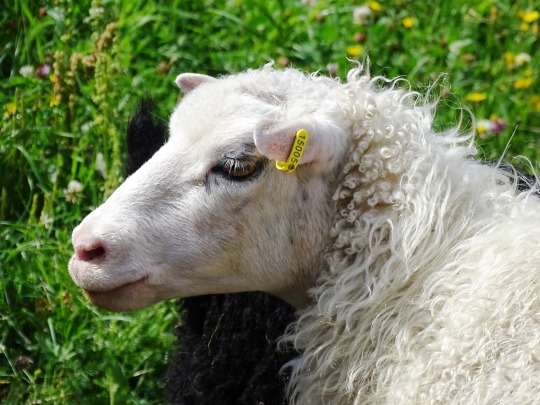









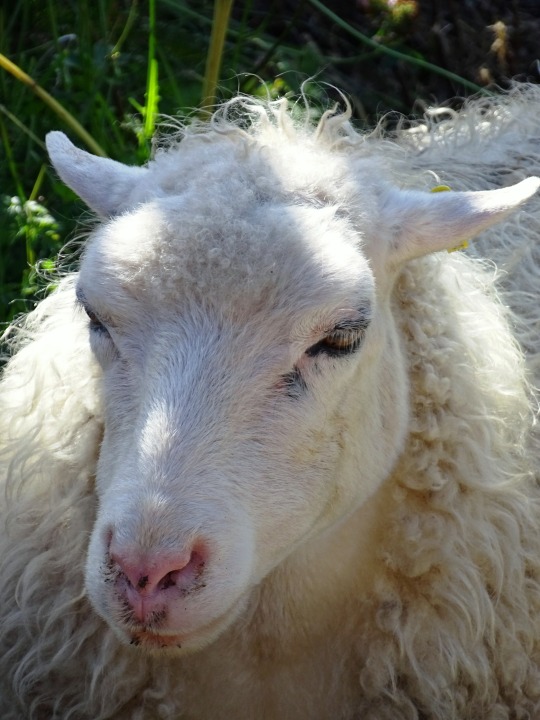
National Hug A Sheep Day
They’re wild and wooly, snuggly and bouncy, and they’re responsible for some of the greatest stuff on Earth. What are we talking about? Why sheep of course! These baaaa-d boys are out there giving you the comfiest of socks, the warmest of sweaters, and some of the best cheese you can imagine outside of a cattle farm.
As if that’s not enough, they also give you lanolin to protect your skin, and at the end of a long day, are some of the most delicious chops you can put on your plate. National Hug A Sheep Day reminds you to thank them for all the wonderful things they bring to your life.
History of National Hug A Sheep Day
National Hug A Sheep Day was started to celebrate all the fantastic sheep that exist all the world over, from those in the wild to those domesticated and living a life-giving us the warmth and comfort of wool.
The original National Hug A Sheep Day was set on the birthday of Punkin, the first sheep the Crazy Sheep Lady of Equinox Farms ever called her own. Punkin was rescued from the Bluegrass Stockyards in 1992 to prevent something bad from happening to him.
Little did either of them know that this was to be the beginning of a beautiful friendship, and a legacy that would cover the next 22 years and counting.
When Punkin passed 12 years later, the Crazy Sheep Lady knew she had to commemorate his passing and encourage people everywhere to show how much they love these wild and wooly critters.
Thus came to pass National Hug A Sheep Day, and from there it slowly but surely grew to be an international affair with farms holding open farm days and other related events to help people show up and hug a sheep!
How to celebrate National Hug A Sheep Day
Well first try to find your way to a local farm and hug yourself a sheep! If you’ve never seen a sheep in person, National Hug A Sheep Day is definitely your opportunity to change that, and your life, for the better.
Look to see if there are open farm days going on nearby and pop by for a visit. Are there no farm days available nearby? Then go down to your local craft store and get yourself a bundle of wool, after all, if you can’t hug a sheep, you can learn how to spin and knit their wool into wonderful, warm, durable clothing!
Source
#National Hug A Sheep Day#NationalHugASheepDay#28 October 2023#travel#last Saturday in October#Töftenas#Tyresta National Park#Stockholm County#Sweden#Sverige#grazing#Scandinavia#summer 2020#vacation#grass#meadow#flora#fauna#Öland#Ottenby Nature Reserve#tourist attraction#landmark#original photography#Bighorn Sheep#wildlife#Yukon#British Columbia#Jasper National Park#Alberta#Canada
0 notes
Text
Nightwish - The Phantom of the Opera
2002
"The Phantom of the Opera" is a song from the 1986 stage musical of the same name, based on the 1910 French novel of the same name by Gaston Leroux, which tells the tragic story of a beautiful soprano, Christine Daaé, who becomes the obsession of a mysterious, masked musical genius living in the subterranean labyrinth beneath the Paris Opéra House. The song was composed by Andrew Lloyd Webber, with lyrics written by Charles Hart and Richard Stilgoe, and additional lyrics by Mike Batt. The song was originally recorded by Sarah Brightman and Steve Harley, which became a UK hit single in 1986, prior to the musical. Listen to it here! In its theatrical debut, it was sung by Brightman and Michael Crawford in their roles as Christine Daaé and the Phantom. Listen to it here! The Phantom of the Opera was the longest running show in Broadway history, and celebrated its 10,000th performance on February 11, 2012, becoming the first Broadway production in history to do so. It is the second longest-running West End musical, after Les Misérables, and the third longest-running West End show overall, after The Mousetrap. The original West End production at Her Majesty's Theatre, London, ended its run in 2020, its run cut short by the COVID-19 pandemic.
Nightwish is a Finnish symphonic metal band from Kitee. The band was formed in 1996 by lead songwriter and keyboardist Tuomas Holopainen, guitarist Emppu Vuorinen, and former lead singer Tarja Turunen. The band soon picked up drummer Jukka Nevalainen, and then bassist Sami Vänskä after the release of their debut album, Angels Fall First (1997). In 2001, Vänskä was replaced by Marko Hietala, who also took over the male vocalist role previously filled by Holopainen or guest singers.
In 2002, Nightwish released Century Child, along with the singles "Ever Dream" and "Bless the Child". Century Child was certified gold two hours after its release, and platinum two weeks afterwards. It set a record on the Finnish album charts of most distance between a first place album and the second place. An enduring favorite of fans is the band's version of "The Phantom of the Opera". The song was routinely played in concerts until October 21, 2005, when vocalist Tarja Turunen was fired from the band and later replaced with Anette Olzon, whereupon the band announced that they would never play the song live again. This would hold true for 17 years until November 27 and 28, 2022, when Nightwish was joined by Dutch singer Henk Poort on stage at the Ziggo Dome in Amsterdam to perform the song. Marko Hietala joined Tarja Turunen at a couple of her solo shows in 2023 to sing "The Phantom of the Opera" with her. They are set to tour together in Spring 2024 in Latin America on Tarja's "Living The Dream – The Hits Tour".
"The Phantom of the Opera" recieved a total of 82,7% yes votes!
youtube
2K notes
·
View notes
Text
Wednesday, 28 October 2020
Once again a new picture of Liam for Tings Magazine gets released

credits to Liam93videos
Zayn on the other hand is in a creative mood as he covers Last Request of Paolo Nutini and James Ray's Hold Back the River. He posts It on his Instagram
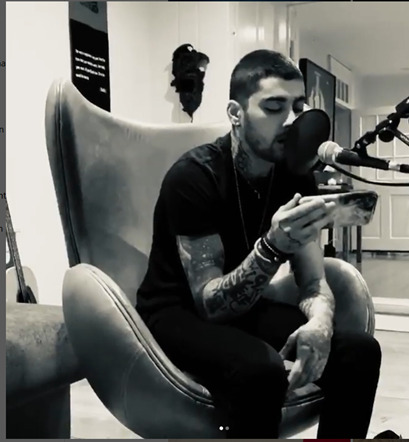
credits to Zayn's Instagram
#Wednesday 28 October 2020#Liam Payne#Tings Magazine#Zayn Malik#Zayn's Instagram#Last Request#Hold Back The River
0 notes
Text


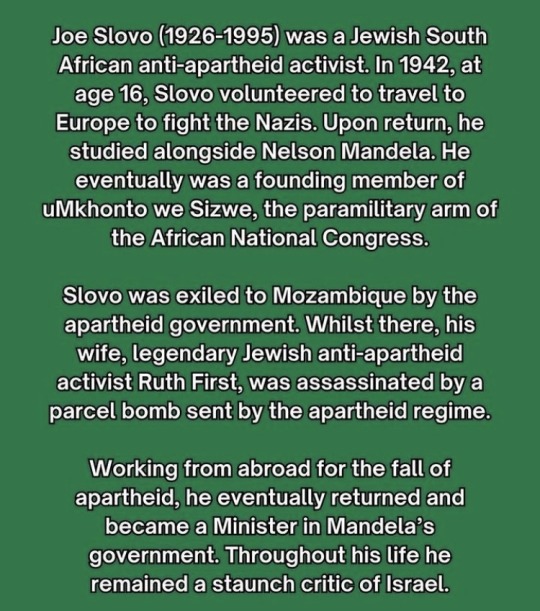


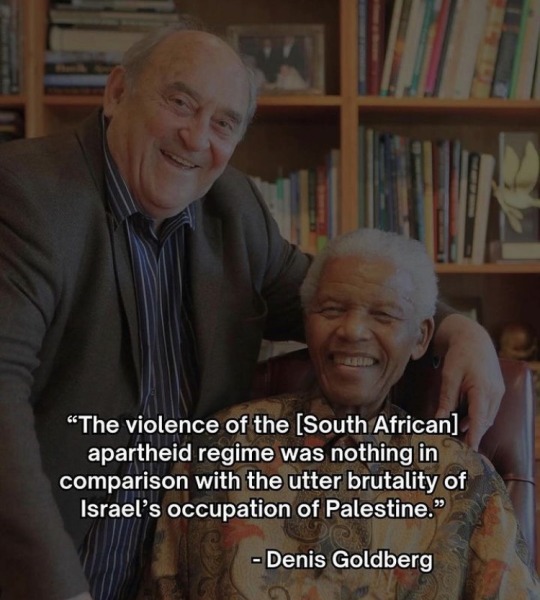




Image transcriptions below:
Legendary South African Jewish Freedom Fighters
And Their Condemnation of Israel
Many people don't know that several of Nelson Mandela's closest and earliest comrades and co-conspirators were South African Jews.
These Jewish comrades and their work was pivotal to the defeat of South African apartheid, giving them a unique perspective on the state of Israel.
—
Joe Slovo (1926-1995) was a Jewish South African anti-apartheid activist. In 1942, at age 16, Slovo volunteered to travel to Europe to fight the Nazis. Upon return, he studied alongside Nelson Mandela. He eventually was a founding member of uMkhonto we Sizwe, the paramilitary arm of the African National Congress.
Slovo was exiled to Mozambique by the apartheid government. Whilst there, his wife, legendary Jewish anti-apartheid activist Ruth First, was assassinated by a parcel bomb sent by the apartheid regime.
Working from abroad for the fall of apartheid, he eventually returned and became a Minister in Mandela's government. Throughout his life he remained a staunch critic of Israel.
—
"Ironically enough, the horrors of the Holocaust became the rationalization for the preparation by Zionists of acts of genocide against the indigenous people of Palestine. Those of us who, in the years that were to follow, raised our voices against the violent apartheid of the Israeli state were vilified by the Zionist press."
- Joe Slovo
—-
Denis Goldberg (1933-2020) was a Jewish South African anti-apartheid activist. He spent 22 years in prison, mostly in solitary confinement, for his political activity alongside Mandela.
He was finally freed when his daughter, who lived in Israel, lobbied the Israeli government, which was closely allied to the apartheid regime, to release him. Due to his staunch opposition to Zionism, he refused to join her in Israel.
—
"The violence of the [South African] apartheid regime was nothing in comparison with the utter brutality of Israel's occupation of Palestine."
- Denis Goldberg
—
Beata Lipman (1928-2016) was a Jewish South African anti-apartheid activist. She drafted the original Freedom Charter in her own handwriting in 1952, which became the basis for the constitution of free South Africa after the fall of apartheid.
Lipman was a proud Jewish critic of Israel, penning many letters condeming Israel over its treatment of Palestinians.
—
"We who have fought against Apartheid and vowed not to allow it to happen again can not allow Israel to continue perpetrating apartheid, colonialism and occupation against the indigenous people of Palestine. We dare not allow Israel to continue violating international law with impunity. Apartheid was a gross violation of human rights. It was so in South Africa and it is so with regard to Israel's persecution of the Palestinians!"
- Beata Lipman in joint letter
—
Ronnie Kasrils is a Jewish South African who was also a founding member and Chief of Intelligence for uMkhonto we Sizwe.
In 1992, Kasrils led an unarmed protest when the apartheid government opened fire, killing 28 of his comrades and injuring over 200 others. He went on to serve in various Ministerial roles after the defeat of apartheid.
In 2001, Kasrils was co-author of the
*Declaration of Conscience by South Africans of Jewish Descent, which calls Israel a colonial apartheid-state. He has drawn criticism for stating that Israel has behaved like the Nazis.
—
"We recognise the operation today by the Palestinian resistance in Gaza as a legitimate expression of their right to resist. We support all efforts of oppressed people to liberate themselves from their oppressors in the same way we did in our liberation struggle.
We are saddened by all violence but Israeli Jews will not realise peace until they accept a future where they will live with Palestinians as citizens in a single, democratic Palestinian state, with Palestinians being compensated for seven decades of colonisation, occupation and apartheid."
- Ronnie Kasrils, 7th October 2023
#free palestine#palestine#gaza#hamas#israel#fuck israel#freedom fighters#resistance#south africa#israel is an apartheid state#apartheid#genocide#from the river to the sea palestine will be free
2K notes
·
View notes
Text
PODCAST RECS - Debunking and Fact-Checking for Witches & Witchcraft Spaces
A collection of podcast episodes fact-checking, debunking, or just providing some clarity on modern myths, misinformation, and conspiracy theories that are frequent flyers in witchcraft and pagan spaces, both theories mistakenly touted by community members and some of the utter drivel spouted by non-witches that still affects us today. Check out these shows on your favorite podcast app!
(Updates to be made whenever I find new content. There will be some crossover with my Witches In History Podcast Recs post and some of the content will be heavy. Blanket trigger warning for violence, abuse, bigotry, sexism, antisemitism, and mistreatment of women, queer people, and children.)
[Last Updated: Dec 29, 2023]
This post is broken into three basic sections:
Historical Misinformation
Modern Myths and the People Who Create Them
Conspiracy Theories and Moral Panics
List of Cited Podcasts, in alphabetical order
American Hysteria
BS-Free Witchcraft
Dig: A History Podcast
Hex Positive
Historical Blindness
History Uncovered
Occultae Veritatis
Our Curious Past
Ridiculous History
Stuff You Missed In History Class
The History of Witchcraft
Unobscured
You’re Wrong About…
Historical Misinformation
General History of Witchcraft
Historical Blindness - A Rediscovery of Witches, Pt 1 & 2
Oct 13, 2020 & Oct. 27, 2020
A discussion of the early modern witch craze and the myths, misconceptions, and theories about witches spread by academics. Topics of discussion include the works of Margaret Murray and Charles Leland, the founding of Wicca, the emergence of the midwife-witch myth, and folk healers as targets of witchcraft accusations. Sarah Handley-Cousins of “Dig: A History Podcast” supplies guest material for both episodes.
Hex Positive, Ep. 36 - Margaret Effing Murray with Trae Dorn
July 1, 2023
Margaret Murray was a celebrated author, historian, folklorist, Egyptologist, archaeologist, anthropologist, first-wave feminist, and the first woman to be appointed to the position of lecturer in archaeology in the UK. So why so we get so annoyed whenever her name is mentioned in conversations about witchcraft? Well, it all has to do with a book Margaret wrote back in 1921...which just so happened to go on to have a profound influence on the roots of the modern witchcraft movement.
Nerd & Tie senpai and host of BS-Free Witchcraft Trae Dorn joins Bree NicGarran in the virtual studio to discuss the thoroughly-discredited witch-cult hypothesis, Murray's various writings and accomplishments, and why modern paganism might not have caught on so strongly without her.
BS-Free Witchcraft, Ep 03: The History of Wicca
October 06, 2018
On this episode, Trae digs deep into the history of Wicca, and tries to give the most accurate history of the religion as they can. I mean, yeah, we know this is a general Witchcraft podcast, but Wicca is the most widely practiced form of Witchcraft in the US, UK, Canada and Australia… so how it got started is kind of important for the modern Witchcraft movement. (And trust me, there aren’t any pulled punches here.)
BS-Free Witchcraft, Ep. 28: The Burning Times
May 30, 2020
On this installment of the podcast, we tackle probably one of the more controversial topics in the modern witchcraft movement: The Burning Times. What were the actual “Burning Times,” where do we get that phrase from, and what really happened? Also, how has this phrase been used in modern witchcraft? It’s a heavy one, folks.
Dig: A History Podcast - Both Man and Witch: Uncovering the Invisible History of Male Witches
Sept 13, 2020
Since at least the 1970s, academic histories of witches and witchcraft have enjoyed a rare level of visibility in popular culture. Feminist, literary, and historical scholarship about witches has shaped popular culture to such a degree that the discipline has become more about unlearning everything we thought we knew about witches. Though historians have continued to investigate and re-interpret witch history, the general public remains fixated on the compelling, feminist narrative of the vulnerable women hanged and burned at the stake for upsetting the patriarchy. While this part of the story can be true, especially in certain contexts, it’s only part of the story, and frankly, not even the most interesting part. Today, we tackle male witches in early modern Eurasia and North America!
Dig: A History Podcast - Doctor, Healer, Midwife, Witch: How the the Women’s Health Movement Created the Myth of the Midwife-Witch
Sept 6, 2020
In 1973, two professors active in the women’s health movement wrote a pamphlet for women to read in the consciousness-raising reading groups. The pamphlet, inspired by Our Bodies, Ourselves, looked to history to explain how women had been marginalized in their own healthcare. Women used to be an important part of the medical profession as midwives, they argued — but the midwives were forced out of practice because they were so often considered witches and persecuted by the patriarchy in the form of the Catholic Church. The idea that midwives were regularly accused of witchcraft seemed so obvious that it quickly became taken as fact. There was only one problem: it wasn’t true. In this episode, we follow the convoluted origin story of the myth of the midwife-witch.
Dig: A History Podcast - Cheesecloth, Spiritualism, and State Secrets: Helen Duncan’s Famous Witchcraft Trial
July 3, 2022
Helen Duncan was charged under the 1735 Witchcraft Act, but her case was no eighteenth-century sensation: she was arrested, charged, and ultimately imprisoned in 1944. Of course, in 1944, Britain was at war, fighting fascism by day on the continent and hiding in air raid shelters by night at home. The spectacle of a Spiritualist medium on trial for witchcraft seemed out of place. What possessed the Home Secretary to allow this trial to make headlines all across the UK in 1944? That’s what we’re here to find out.
The Conspirators, Ep. 63 - The Last Witch Trial
Nov. 26, 2017
England’s official laws regarding the prosecution of witches dates back to the 1600s. Those very same laws would also remain on the books until well into the 20th century. In 1944, a psychic medium named Helen Duncan would gain notoriety by becoming the last woman to be tried under England’s witchcraft laws.
The History of Witchcraft Podcast, hosted by Samuel Hume
Witches didn’t exist, and yet thousands of people were executed for the crime of witchcraft. Why? The belief in magic and witchcraft has existed in every recorded human culture; this podcast looks at how people explained the inexplicable, turned random acts of nature into conscious acts of mortal or supernatural beings, and how desperate communities took revenge against the suspected perpetrators.
Unobscured, Season One - The Salem Witch Trials
Welcome to Salem, Massachusetts. It’s 1692. And all hell is about to break loose.
Unobscured is a deep-dive history podcast from the labs of How Stuff Works, featuring the writing and narrative talents of Aaron Mahnke, horror novelist and the mind behind Lore and Cabinet of Curiosities.
As with his other series, Mahnke approaches the events in Salem armed with a mountain of research. Interviews with prominent historians add depth and documentation to each episode. And it’s not just the trials you’ll learn about; it’s the stories of the people, places, attitudes, and conflicts that led to the deaths of more than twenty innocent people.
Each week, a new aspect of the story is explored, gradually weaving events and personalities together in chronological order to create a perspective of the trials that is both expansive and intimate. From Bridget Bishop to Cotton Mather, from Andover to Salem Town, Mahkne digs deep to uncover the truth behind the most notorious witch trials in American history.
Think you know the story of Salem? Think again.
Witchcraft Practices
BS-Free Witchcraft, Ep. 43 - “Lilith”
Jan. 29, 2022
Host Trae Dorn discusses the ongoing debate over whether or not it’s okay for non-Jewish witches to incorporate Lilith into their practices. Is Lilith closed? Is it cultural appropriation? There’s so much misinformation in New Age and poorly written witchcraft books on Lilith, it’s hard for some witches to get a clear picture. It’s common to run into folks on social media talking about Lilith as a “Goddess,” which she very much isn’t. Let’s dive into the origins of the folklore surrounding this figure, and we’ll let you decide whether or not it’s okay to work with Lilith. But, uh, spoiler – we don’t think you should.
Historical Blindness, Ep. 106 - Lilith, the Phantom Maiden
November 22, 2022
Host Nathaniel Lloyd explores the evolution of the figure of Lilith, from Mesopotamian demon, to the first woman created by God, and back to a succubus mother of demons. It’s a tale of syncretism, superstition, forgery, and a dubious interpretation of scriptures.
BS-Free Witchcraft, Ep. 55 - Lucky Girl Syndrome and the Law of Attraction
January 28, 2023
Trae takes a look at one of New Age spirituality’s most toxic philosophies - The Law of Attraction. The history of the idea is discussed, where it came from, and how this dangerous combination of prosperity gospel, purity culture, and victim-blaming has come back in a major way to a whole new generation as “Lucky Girl Syndrome.”
Hex Positive, Ep. 19 - The Trouble with Tarot
August 1, 2021
Tarot and tarot-reading have been a part of the modern witchcraft movement since the 1960s. But where did these cards and their meanings come from? Are they secretly Ancient Egyptian mystical texts? Do they have their origins among the Romani people? Are they a sacred closed practice that should not be used by outsiders? Nope, nope, and nope.
This month, we delve into the actual history of tarot cards, discover their origins on the gaming tables of Italy and France, meet the people who developed their imagery and symbolism into the deck we know today, and debunk some of the nonsense that’s been going around lately concerning their use. The Witchstorian is putting on her research specs for this one!
Stuff You Missed in History Class - A Brief History of Tarot Cards
Oct. 26, 2020
How did a card game gain a reputation for being connected to mysticism? Tarot’s history takes a significant turn in the 18th century, but much of that shift in perception is based on one author’s suppositions and theories.
Hex Positive, Ep. 23 - The Name of the Game
November 1, 2021
Bree delves into the history, myths, and urban legends surrounding Ouija boards. Along the way, we’ll uncover their origins in the spiritualist movement, discover the pop culture phenomenon that labeled them portals to hell, and try to separate fact from internet fiction with regard to what these talking boards can actually do.
Our Curious Past, Ep. 20 - The Curious History of the Ouija Board
August 18, 2023
Host Peter Laws explores the history of the “talking board,” which was wildly popular in the early 1900s, until something happened that would tarnish its’ reputation for good.
Ridiculous History - Brooms and Witchcraft, Pt. 1 & 2
Oct. 13-15, 2020
Most people are familiar with the stereotypical image of a witch: a haggard, often older individual with a peaked hat, black robes, a demonic familiar and, oddly enough, a penchant for cruising around on broomsticks. But where did that last weirdly specific trop of flying on a broomstick actually come from? Could the stereotype of witches on broomsticks actually be a drug reference? Join Ben, Noel, and Casey as they continue digging through the history and folklore of witchcraft - and how it affected pop culture in the modern day.
Historical Blindness, Ep. 116 - The Key to the Secrets of King Solomon
May 02, 2023
Host Nathaniel Lloyd continues his occasional series on the history and mythology of magic. In this installment, he looks at the development of the story that the biblical King Solomon was actually a flying-carpet-riding, magic-ring-wielding wizard and alchemist who bound demons to do his will. The origins and content of the legendary Key of Solomon are also discussed.
Dig: A History Podcast - Plastic Shamans and Spiritual Hucksters: A History of Peddling and Protecting Native American Spirituality
July 24, 2022
In the late 20th century, white Americans flocked to New Age spirituality, collecting crystals, hugging trees, and finding their places in the great Medicine Wheel. Many didn’t realize - or didn’t care - that much of this spirituality was based on the spiritual faiths and practices of Native American tribes. Frustrated with what they called “spiritual hucksterism,” members of the American Indian Movement (AIM) began protesting - and have never stopped. Who were these “plastic shamans,” and how did the spiritual services they sold become so popular?
Holidays
Hex Positive, Ep. 28 - The Easter-Ostara Debacle
April 1, 2022
Host Bree NicGarran puts on her Witchstorian hat once more to delve into the origins of both Easter and Ostara and to finally answer the age-old question: which came first – the bunny or the egg?
Historical Blindness, Ep. 28 - A Very Historically Blind Christmas
Dec. 18, 2018
An exploration of the origins of Christmas traditions, with special guest Brian Earl of the Christmas Past podcast. (There is also some mention of Christmas witches!) Further installments of this series explore additional Christmas traditions and iconography which have been falsely claimed to have pagan origins as well as the myths surrounding the history of Christmas itself. (Eps. 47, 63, 84, & 132 in December of subsequent years)
Modern Myths and the People Who Create Them
Ed and Lorraine Warren
You’re Wrong About…Ed and Lorraine Warren w. Jamie Loftus
November 8, 2021
Special Guest Jamie Loftus tells Sarah about Ed and Lorraine Warren (of The Conjuring and Annabelle fame). Topics of interest include Connecticut as a locus of scary happenings, New England uncles, and psychic communication with a tearstained Bigfoot.
Dig: A History Podcast - The Demonologist and the Clairvoyant: Ed and Lorraine Warren, Paranormal Investigation, and Exorcism in the Modern World
Oct 3, 2021
In the 1970s, Lorraine and Ed Warren had a spotlight of paranormal obsession shining on them. In the last decade, their work as paranormal investigators–ghost hunters–has been the premise for a blockbuster horror franchise totaling at least seven films so far, and more planned in the near future. So… what the heck? Is this for real? Yes, friends, today we’re talking about demonology, psychic connections to the dead, and the patriarchy. Just a typical day with your historians at Dig.
History Uncovered, Ep. 92 - The Enfield Haunting That Inspired "The Conjuring 2"
Oct 25, 2023
The Enfield Haunting began with a bang. Literally. From 1977 to 1979, an unassuming North London home was the site of near-constant paranormal activity, from knocking sounds and moving objects to disembodied voices and the terrifying alleged possession of one young daughter of the Hodgson family. But how much truth was there to these happenings? And since the Warrens got involved briefly and subsequently touted themselves as experts on the case (and made money from talking about it), how much of what we think we know reflects the actual events?
"Paranormal" Literature
You’re Wrong About…Winter Book Club - The Amityville Horror, Pts. 1-3
Dec. 20, 2021 - Feb. 6, 2022
Sarah tells guest host Jamie Loftus about the Amityville Horror, how it’s a Christmas story, and buying murder furniture might not be such a great idea. Further highlights include Jodie the Demon Pig, poor insulation and terrible parenting as evidence of a haunting, lots and lots of sunk cost fallacy, and how the book kind of debunks itself.
You’re Wrong About… - Michelle Remembers, Pt. 1-5
March 26, 2020 - April 30, 2020
Intrepid hosts Sarah and Mike delve into one of the foundational texts of the Satanic Panic - “Michelle Remembers.” A young woman spends a year undergoing hypnosis therapy, which uncovers repressed memories of shocking and horrifying abuse at the hands of a Satanic cult. The book became a foundational text for both mental health professionals and law enforcement attempting to grapple with an alleged nationwide network of insidiously invisible child-abducting cults. The only problem is…none of what Michelle remembered ever actually happened.
You’re Wrong About…. - The Satan Seller, Pt. 1-5
June 28, 2021 - August 9, 2021
Sarah and Mike return to Camp You’re Wrong About for another Satanic Panic story hour. This time, the summer book club explores Mike Warnke’s 1972 “memoir” about joining a demonic cult, rising through the ranks of Satan’s favorite lackeys, his sudden downfall and redemption, and the California hedonism that made him do it. This is followed by a discussion of the Cornerstone Magazine exposé that brought the facts to light and thoroughly discredited Warnke’s story.
American Hysteria, Eps. 64-66 - Chick Tracts, Pts. 1-3
March 20 - April 03, 2023
In his own lifetime, Jack Chick was one of most prolific and widely-read comic artists in history. His company, Chick Tracts, published hundreds of millions of copies of pocket-sized bible comics, filled with lurid illustrations of cackling demons, wicked witches, and sinister cults, all hell-bent on corrupting any hapless mortal they could get their hands on. These tracts were meant to be left where they might be found by a sinner in need of salvation, with a scared-straight morality-play approach to Christianity that contributed in no small part to the period in the late 20th century we now call the Satanic Panic. (There’s also a follow-up two-part episode about one of Chick’s “occult experts,” who claimed to be, among other things, a real-life vampire.)
History Uncovered, Ep. 95 - Roland Doe, The Boy Who Inspired "The Exorcist"
November 15, 2023
In 1949, priests performed an exorcism on a boy referred to as "Roland Doe," aka Ronald Hunkeler, in a chilling ordeal that became the real-life inspiration for William Peter Blatty's 1971 book, "The Exorcist," and the movie adaptation released in 1973. But what really happened during this alleged exorcism and was there any proof of the claims of alleged demonic paranormal activity surrounding the events?
You're Wrong About... - The Exorcist (with Marlena Williams)
December 27, 2023
Marlena Williams, author of "Night Mother: A Personal and Cultural History of the Exorcist," joins host Sarah Marshall to discuss the little possession movie that changed America forever. Was the set cursed by Satan himself, or plain old 70s misogyny? What makes a country going through a cultural upheaval embrace stories about the Devil? And - the most critical question of all - do Ouija boards really cause possession?
Conspiracy Theories and Moral Panics
Secret Societies and Antisemitism
Historical Blindness, Ep. 14 - Bloody Libel
December 12, 2017
An exploration of one of the most destructive myths in history - the blood libel, or the false accusation that Jews of the Middle Ages and beyond ritually murdered Christian children, a lie that host Nathaniel Lloyd traces back to its’ roots in medieval England and the murder of one Young William of Norwich.
Historical Blindness, Eps. 56-57 - The Illuminati Illuminated
September 15-29, 2020
A contemplation of the modern conservative conspiracy theory of a “deep state” leads host Nathaniel Lloyd back to the dawn of the modern conspiracy theory, the Enlightenment, when the ultimate conservative conspiracy theory was born as an explanation for the French Revolution: The Illuminati!
Historical Blindness, Eps. 38-40 - Nazi Occultism, Parts 1-3
July 2-30, 2019
An exploration of the dark roots of Nazi occult philosophies, from a neo-paganism preoccupied with the Nordic Pantheon, to a folksy back-to-the-land movement that evolved into a nationalist sentiment, to an ideology of racial supremacy all tied up with contemporary myths and pseudoscience.
(The host is careful to note with clarity and vehemence at the start of each episode that this series IN NO WAY approves of, promotes, or supports this ideology and Nazism is roundly condemned at every turn. It’s not an easy listen, but understanding how and why this bigotry continues to be a problem in pagan spaces and how to recognize it is very important.)
TL;DR - Fuck Nazis. No tolerance for genocidal fuckwads.
DIG: A History Podcast - Werewolves, Vampires, and the Aryans of Ancient Atlantis: The Occultic Roots of the Nazi Party
Oct 17, 2021
Modern movie plotlines which portray Nazi obsessions with occultism might be exaggerated for dramatic effect, but they aren't made up out of wholecloth. The NSDAP, or the National Socialist Worker's Party, was a party ideologically enabled by occultist theories about the Aryan race and vampiric Jews, on old folk tales about secret vigilante courts and nationalist werewolves, and on pseudoscientific ideas about ice moons. In this episode, the hosts explore the occult ideas, racial mythology, and 'supernatural imaginary' that helped to create the Nazi Party.
The Satanic Panic
American Hysteria - Satanic Panic, pt 1 & 2
Dec. 10 2018 - Jan. 07, 2019
This two-part episode covers perhaps the most mystifying moral panic in US history, the 1980s and early 90s ‘Satanic Panic.’ For this episode, Chelsey covers the rise of organized Satanism beginning in the late 60s, as well as the adversarial countercultures of the hippies and the metalheads, and their apparent Satanic crimes that would be hailed as proof of their evil, as well as proof that teens, as well as children, were in serious moral peril. Satan was allegedly hypnotizing the youth with secret messages in backwards rock songs, teaching them occult magic in Saturday morning cartoons, and causing suicides through a popular role-playing games, all while helping religion blur into politics for good.
For part two, Chelsey will cover what came next, a serious investigation into an imagined network of Satanic cults ritually abusing children in daycare centers all over the country. Chelsey will try to understand this shocking decade in history, why it really happened, and the cultural issues it was really about.
BS-Free Witchcraft, Ep 10 - The Satanic Panic
April 27, 2019
The Satanic Panic of the 70s, 80s, and 90s shaped the Modern Witchcraft Movement in a lot of unexpected ways. Its effects still ripple through a lot of our sources, so in this installment of the podcast we’re digging into this extremely weird part of American history. It’s a bit of a doozy, after all.
BS-Free Witchcraft - Ep. 32: A New Satanic Panic?
February 27, 2021
A couple of years ago, we did an episode on the history of the Satanic Panic of the latter half of the twentieth century, but recent events have led us to ask - could it be happening again? It’s very possible that we are at the start of a new wave of satanic panic, and QAnon is just the latest symptom of a larger problem.
Occultae Veritatis, Case #014: Satanic Panic of Martensville
Jan. 28, 2018
Today the hosts cover one of the various Satanic ritual abuse scandals that happened close to them. Is it full of hot air and false allegations? Yes. Yes it is.
Occultae Veritatis, Case #097A & B: Dungeons, Dragons, and the Satanic Panic
Dec. 07, 2019 - Dec. 15, 2019
Dungeons & Dragons, introduced in 1974, attracted millions of players, along with accusations by some religious figures that the game fostered demon worship and a belief in witchcraft and magic.
[Last Updated: Dec 29, 2023]
696 notes
·
View notes
Text
This is why I hate it when MRAs whine about the courts “favoring” the mothers
How the 'junk science' of parental alienation infiltrated American family courts and allowed accused child abusers to win custody of their kids.
This story was reported in partnership with the nonprofit newsroom Type Investigations.
In the summer of 2020, when he was 12, the boy told his therapist something he'd never told anyone else.
For years, Robert claimed, his stepdad had sexually abused him.
The therapist alerted the San Diego County child welfare agency, which launched an investigation. The county sheriff opened an inquiry, too. Thomas Winenger, the only father figure Robert had ever known, began assaulting him when he was only 7, Robert told a forensic social worker in October 2020. Winenger would pin him down, cover his mouth, and force him into acts he found "disgusting," he said. Sometimes, he said, Winenger recited Bible verses during the attacks, claiming the devil was in Robert's heart.
Robert, whom Insider is identifying by only his middle name, said that as he struggled to breathe, he fought back by hitting, punching, and kneeing his stepfather. But he said Winenger overpowered him.
By the time Robert came forward, Winenger had been named his legal father and was divorced from Robert's mother, Jill Montes, with whom he also shared two young daughters. Robert confronted Winenger with the allegations that November, and within weeks Winenger denied the claims in family court. "This NEVER HAPPENED," he asserted in a filing.
He offered an alternative explanation for Robert's disturbing claims, one that shifted the blame to Robert's mother.
Montes, Winenger contended, had engaged in a pattern of manipulation known as "parental alienation." Robert's accusations weren't evidence that he'd abused the boy, Winenger claimed. They were evidence that Montes had poisoned the children against him. The delayed timing of Robert's allegations, Winenger argued, only made them more suspicious. Montes was causing the children such grave psychological harm, he claimed in the filing, that the children should be transferred to his custody right away.
That December, Child Welfare Services substantiated Robert's allegations, calling them "credible, clear, and concise." But the family-court judge, Commissioner Patti Ratekin, withheld judgment until the following October, when the psychologist she'd appointed as a custody evaluator submitted his own report.
That report, which has been sealed by the court, appears to have convinced Ratekin that Winenger was correct.
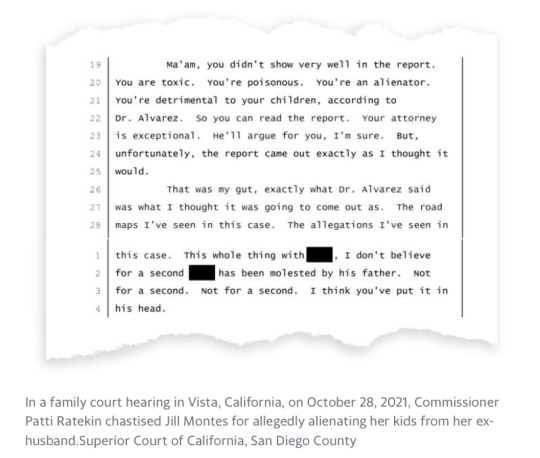
“Ma'am, you didn't show very well in the report. You are toxic. You're poisonous. You're an alienator," Ratekin told Montes at a hearing on October 28, 2021. "I don't believe for a second" that Robert's father molested him. "Not for a second," she repeated. "I think you've put it in his head."
Ratekin acted swiftly, granting Winenger's bid for custody and ordering him to enroll Robert and his sisters in Family Bridges, a program that claims to help "alienated" children reconnect with a parent they've rejected. She barred Montes, a stay-at-home mom and home schooler, from all contact with her children for at least 90 days, a standard prerequisite for admission to the program.
"I just wanted to crumble," Montes said.
Rejected as a psychiatric disorder
Parental alienation is a fairly recent idea, conceived in the 1980s by a psychiatrist, Dr. Richard Gardner, who argued that divorcing mothers, desperate to win custody suits, were brainwashing children against their fathers. In "severe" cases, Gardner wrote, children with "parental alienation syndrome" must be removed from their mothers, transferred to the care of their fathers, and reeducated through what he called "threat therapy."
Alienation has never been accepted as a psychiatric disorder by the medical establishment. Yet today, mental-health practitioners across the United States assess and treat it, particularly those who specialize in custody cases. Many of them collaborate closely, attending the same conferences, following the same protocols, and citing the same papers. Some run reunification programs like Family Bridges; others offer family therapy or produce custody evaluations for family courts.
Influenced by these experts, many judges have given the unproven concept the force of law.
Though most custody cases settle out of court, in a small fraction parents don't come to terms. In some of these contested cases, one parent accuses the other of alienating the children. The most intense disputes arise in cases where one parent alleges spousal or child abuse and the other responds with a claim of alienation.
But alienation claims are highly gendered. Men level the accusation against women nearly six times as often as women level it against men, one study suggests. That landmark study, published in 2020, found that in cases when mothers alleged abuse and fathers responded by claiming alienation, the mothers stood a startlingly high chance of losing custody.
Occasionally, parents accused of alienation are cut off from their children altogether. Since 2000, judges have sent at least 600 children to reunification programs that recommend the temporary exile of the trusted parent, a collaborative investigation by Insider and Type Investigations revealed. While the programs suggest a "no-contact period" of 90 days, this term is routinely extended and may last years, according to an analysis of tens of thousands of pages of court papers and program records.
The treatment typically starts with a four-day workshop for children and the parent they've rejected; aftercare can add months or years. Children may be seized for the workshop by force, with no opportunity for goodbyes.
Former participants at Family Bridges and a similar program, Turning Points for Families, said they were taught that their memories were unreliable, the parent they preferred was harmful, and the parent they'd rejected was loving and safe. In some cases, participants who resisted these lessons said they were verbally threatened; at Family Bridges, a few were threatened with institutionalization. Some participants said they ended up depressed and suicidal.
Program officials say they are helping children. Lynn Steinberg, a therapist who runs a program called One Family at a Time, said in an interview that virtually all the kids she's enrolled have falsely accused a parent of abuse and that she does not accept children into her program whose abuse claims have been substantiated. Without treatment, she said, alienated children would risk being plagued by guilt, and the relationship they wrongly spurned might never heal.
In Steinberg's view, the only child abusers in the families she sees are the "alienators," who have "annihilated" a devoted parent from their children's lives.
Recently, alienation theory has faced rising criticism. Efforts to legitimize the diagnosis have been rebuffed by the American Psychiatric Association, the World Health Organization, and the American Professional Society on the Abuse of Children. And the reunification programs burst into public view last fall, when a video documented two terrified children in Santa Cruz, California, being seized for One Family at a Time. In the clip, which went viral on TikTok, a 15-year-old girl named Maya pleads and shrieks as she's picked up by the arms and legs and forced into a black SUV.
Since then, bills that would restrict reunification programs have been introduced in Sacramento and four other state capitols.
An idea takes off
When a law professor named Joan Meier founded a nonprofit to help victims of domestic violence two decades ago, she didn't expect to focus on custody disputes. But day after day, she heard from mothers with similar, troubling stories. They'd finally escaped their abusive marriages, but their exes had fought them for custody — and won. The mothers had been accused of something Meier knew little about: parental alienation.
Meier, who taught at George Washington University, ordered a stack of books by the child psychiatrist who coined the term.
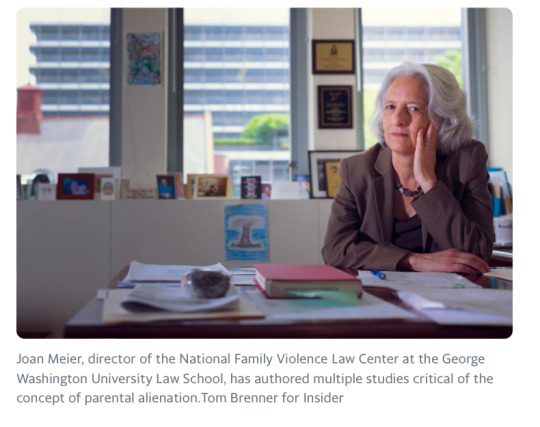
Richard Gardner began writing about children of divorce in the 1970s, when a dramatic transformation was underway in family court. Under the "tender years presumption," judges had long favored women in divorce cases, typically assigning children to their mother's sole custody. But as more women entered the workforce, more men participated in child-rearing, and more couples divorced, a nascent "fathers' rights" movement emerged, demanding gender neutrality in custody proceedings. The idea appealed to many feminists, too. By the 1980s, most states had recognized joint custody in their statutes.
This left judges in a quandary when couples failed to settle. Now, aside from a vague mandate to advance the "best interest" of children, courts lacked a clear paradigm for resolving disputes. Overwhelmed, judges turned to mental-health professionals, asking them to assess each parent's fitness and recommend an optimal arrangement. Gardner, then an associate clinical professor of child psychiatry at Columbia University, was an early custody evaluator, and in 1982 he published a how-to manual.
By 1985, Gardner was arguing that some mothers, seeking to regain their advantage in court, were inducing a mental illness in their children, a condition he dubbed parental alienation syndrome. Children afflicted with the syndrome, he said, could be identified by the "campaign of denigration" they waged against their fathers, which was accompanied by "weak, frivolous, or absurd" rationalizations and a disquieting "lack of ambivalence."
Some "fanatic" mothers even manipulated children into claiming their fathers had sexually abused them, Gardner contended. When other maneuvers against a father fail, he wrote, "the sex-abuse accusation emerges as a final attempt to remove him entirely from the children's lives." Child sexual-abuse claims made during custody disputes, he claimed, "have a high likelihood of being false." To prove children are suggestible, he often invoked the wave of 1980s cases in which preschool teachers were charged with sexual abuse but later exonerated.
Gardner's theory sidestepped what Joan Meier saw as a glaring truth: Many children accused their fathers of abuse because their fathers were actually abusive. In fact, by the early 2000s a large-scale study had found that contrary to Gardner's writings, neither children nor mothers were likely to fabricate claims during custody disputes.
The remedies Gardner proposed for parental alienation syndrome were harsh. "Insight, tenderness, sympathy, empathy have no place in the treatment of PAS," he said in a 1998 address. "Here you need a therapist who is hard-nosed, who is comfortable with authoritarian, dictatorial procedures."
In a 2001 documentary, Gardner told a journalist how a mother might respond to a child reporting sexual abuse: "I don't believe you. I'm going to beat you for saying it. Don't you ever talk that way again about your father."
Juvenile detention could cure children who refused to visit their fathers, Gardner said. But the main remedy he advanced in severe cases was "the removal of the children from the mother's home and placement in the home of the father, the allegedly-hated parent." This would break what he called a "sick psychological bond."
After introducing his theory, Gardner began using it in expert testimony and promoting it to other evaluators and fathers'-rights activists. By the early 2000s, family-court judges were regularly citing parental alienation.
To address this, Meier said, she undertook a series of academic articles examining the scholarship on parental alienation. She found that the theory was based on circular reasoning and anchored almost entirely in anecdotal data.
"I still believed in that day that if you did careful, thoughtful analytic scholarship, people would read it and be persuaded by it," she said.
The scarlet 'A'
Jill Montes had always wanted a big family. In 2008, she already had a 5-year-old daughter, Paige, with a man she'd divorced, and she was finding regular work as an actor in Los Angeles. She decided to adopt an infant son, Robert.
The next year, she met Thomas Winenger, who had master's degrees in engineering and business, on eHarmony. "He wanted to talk a lot about faith and God, and that wooed me," she said. She also welcomed his interest in Robert, whom she was insecure about raising alone.

In 2011, the couple married and settled near San Diego, and Montes quit acting. Soon, she later said in a court filing, Winenger was shoving, insulting, and threatening her, often in front of the kids. He promised to change, and she hoped he could. In 2012, their first child, Claire, was born, and Eden followed in 2015. Insider is identifying Montes' children by only their middle names.
Later that year, Montes accused Winenger of dragging Paige across a room. Montes sought a restraining order, which was ultimately denied, and kicked him out. He rented a room in a house nearby, where he regularly hosted the three younger kids. Sometimes, Robert went there by himself.
Montes filed for divorce in February 2018. Under an informal agreement, the kids continued spending time at Winenger's place. But at a hearing that fall, a 10-year-old Robert testified that during an argument over his math homework, Winenger had repeatedly grabbed, shoved, and spanked him.
Montes filed a petition for a domestic-violence restraining order, which Winenger fought, saying he hadn't mistreated Robert. In the end, Ratekin, the judge presiding over the divorce, signed a "stay away" order prohibiting Winenger from contact with Robert. But it didn't address the allegation of violence. Weeks later, Winenger asked Ratekin to name him Robert's legal father, arguing that he'd helped raise the boy from toddlerhood. Ratekin ruled in his favor and ordered the custody evaluation.
In court papers he filed on July 19, 2019, the day after the evaluator was appointed, Winenger accused Montes of parental alienation.
Often, according to Meier, the dynamic of a custody case shifts radically once alienation is raised. "It's like the table turns 180 degrees and now the only bad parent in the room is the alleged alienator," she said. An abuse allegation "fades out of view," she said, and any attempts by the mother to limit the father's access are seen as suspicious. It's almost as if, like Hester Prynne in "The Scarlet Letter," she's been branded with a flaming red "A," Meier said.
Indeed, Montes soon lost ground in court.
In January 2020, Ratekin ordered Robert into the care of a therapist, Mitra Sarkhosh, who has since provided aftercare for at least one reunification program. Sarkhosh saw Robert and his father together about 20 times, charging $200 an hour. But by summer, she had halted the sessions, saying Robert's anger was "not improving."
In a report filed in court, Sarkhosh appeared to blame Montes. Living with her, Robert was "saturated with negativity about his father," she wrote. There may be a need for "new interventions." (Citing patient-confidentiality laws, Sarkhosh declined an interview request.)
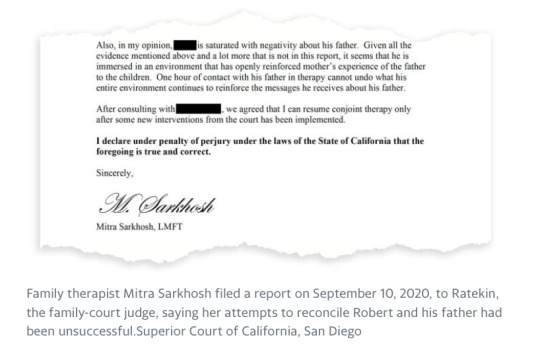
Robert was relieved to be finished with Sarkhosh, Montes said. He started seeing a new therapist, and, during the first session, he told the therapist he'd been sexually abused.
On November 18, 2020, at the direction of the San Diego County Sheriff's Department, Robert called Winenger to try to elicit a confession. When that failed, the department paused its investigation, but the child welfare inquiry proceeded. On December 1, the California Health and Welfare Agency issued a report substantiating Robert's claims.
"The Agency is worried that if given the opportunity, Tom Winenger will sexually abuse [Robert] again," the report says.
Neither Winenger nor his divorce attorney, Tamatha Clemens, responded to requests for interviews or to a list of detailed questions. In a motion for custody he filed on December 8, 2020, Winenger argued that Robert's allegations had been "orchestrated" by Montes and that her alienation "will not stop until she is restrained by the court."
The welfare agency sent Ratekin its report on January 4, 2021, according to a cover sheet reviewed by Insider. But Ratekin was still awaiting the custody evaluation, which she'd assigned to a psychologist, Miguel Alvarez. In 2009, Alvarez coauthored a handbook for parents in custody disputes. While the manual spells out in detail how to prove an alienation claim, it offers no specific guidance on how to prove a claim of abuse.
According to the report, part of which Insider reviewed at a San Diego County courthouse, a personality test Alvarez administered suggested that Montes suffered from "extreme hyper-vigilance" and "persecutory fears." People with these traits, Alvarez wrote, "are often quick to anger and overreact to perceived or imagined threats."
Winenger's scores on the same test were "normal," Alvarez wrote, and his performance on psychosexual and polygraph tests was "inconsistent" with Robert's allegations of sexual abuse.
The 136-page evaluation cost Robert's parents more than $90,000, according to bills reviewed by Insider. Alvarez didn't respond to requests for comment.
Ratekin reviewed the evaluation just before the October 28, 2021 hearing. Alvarez's findings were "exactly" what she'd expected, she said. In her view, the situation called for immediate action.
She put Claire, 8, and Eden, 6, in their father's custody that day, and she sent Robert, 13, to stay with his football coach. That was for Winenger's protection, she said. Until Robert was "detoxified," she said, he'd be prone to false claims of abuse.
Ratekin suggested Family Bridges as a solution. She'd had "really good success" with the program in another case, she said, and she thought it would ease Robert's transition. Without it, the boy wouldn't "get better," she said, and his sisters stood to benefit, too.
Winenger agreed. Under an order Ratekin signed on January 3, 2022, the children would attend a Family Bridges workshop with their father from January 11 to 14 and then return to his home. Montes was barred from contact with the children for at least 90 more days. Ratekin also prohibited the children from communicating with their older sister, their maternal grandmother, and anyone else who might "interfere" with their healing.
Contact would resume at Ratekin's discretion, depending upon how well everyone was cooperating.
Insider and Type reviewed 35 cases from the past two decades in which judges removed children from their preferred parent and sent them to a reunification program. In most of these cases, the children had resisted court-ordered visits with their fathers, and judges had held mothers responsible. Many of the judges framed the no-contact period as salutary: Children would be freed from the overbearing influence of their mothers, and their mothers would be motivated to change.
A case from New Castle County, Delaware is typical.
In 2016, Judge Janell Ostroski transferred two brothers to their father's custody and ordered them into treatment at Turning Points for Families, a program in upstate New York run by a social worker, Linda Gottlieb. Both boys had told Ostroski that their father, Michael D., yelled at them frequently, court records show, though neither had alleged physical abuse. The 9-year-old, O., told Ostroski he felt unsafe at his dad's house. Ashton, 14, was refusing to go there. Insider is not using the family's full last name in order to protect O.'s identity.
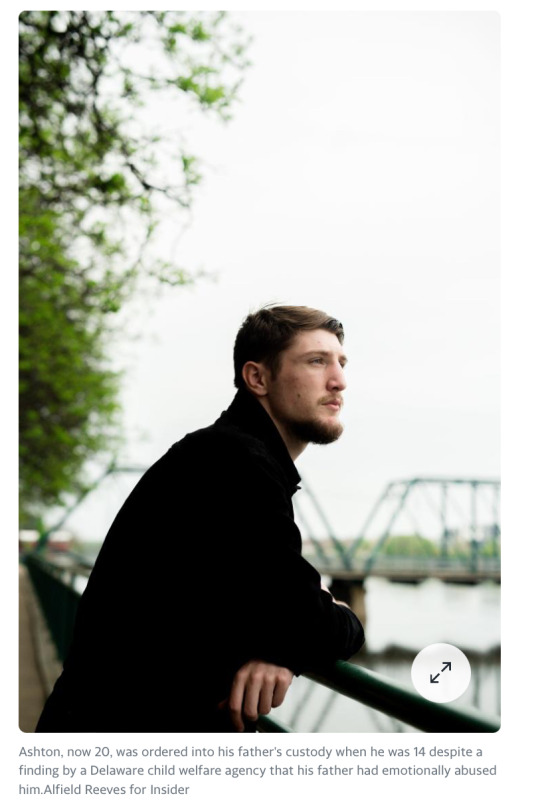
Michael had pleaded guilty several years earlier to public intoxication and indecent exposure for an incident in a public park with Ashton. A court-ordered psychological evaluation found that he had alcohol dependence and narcissistic personality disorder "with antisocial features." In 2013, the state's child welfare agency found that he'd emotionally abused Ashton, then 10 years old. The report, including any denials Michael presented, is sealed. This history was all cited in court three years later, in a custody dispute between Michael and his ex-wife, Kelly D.
During that dispute, Michael accused Kelly of alienation, and a custody evaluator backed him up. The evaluator, a psychologist, determined that Michael had become "a more positively functional person" and that Kelly, a preschool teacher, was the problematic parent. Kelly "distorts the reality of events" and "conveys to others an inaccurate and menacing perception of Mr. [D.]," the psychologist wrote in a May 2016 report. (Michael did not respond to detailed requests for comment. Neither did the psychologist.)
In written rulings that barred Kelly from contact with both children, Ostroski said the boys were "well cared for" in Kelly's home but blamed her for Ashton's refusal to see Michael. "Mother has done nothing in the past year to promote the Father/son relationship," Ostroski wrote, adding, "the court is hopeful that, with the appropriate interventions, Mother can recognize her role in helping the children have a healthy relationship with their Father."
Insider and Type sent questions about parental alienation and its remedies to Ostroski, Ratekin, and 19 other judges who've ordered the programs. Only Ratekin responded, and she declined to speak about the Winenger case because it is still pending. Nor would she answer general questions. "I am definitely not an expert in this area," she wrote, "nor do I feel qualified to answer questions about the issue or programs."
'A moratorium on the past'
In her January 2022 ruling, Ratekin authorized Winenger to hire a transport company to drive Robert and his sisters to the Family Bridges workshop, which would take place at a hotel a few hours outside San Diego. There, the children and Winenger met Randy Rand, who founded Family Bridges in the early 2000s, and a woman the children knew only as "Chris."
In 2009, Rand deactivated his psychology license after the California Board of Psychology found he'd committed professional violations including "dishonesty," "repeated negligent acts," and "gross negligence." Since then, he's accompanied at workshops by at least one other clinician.
Rand isn't the only alienation expert to face sanctions from a state licensing board. Two other psychologists who've led Family Bridges workshops, Jane Shatz of California and Joann Murphey of Texas, have been sanctioned — Shatz after an allegation of negligence and Murphey after a finding that she failed to respond promptly to a subpoena. Both Alvarez, the custody evaluator in Robert's case, and Steinberg, who runs the program where a judge sent the girl in the viral TikTok, have been cited by California regulators for improper recordkeeping. Steinberg said her citation was the result of a series of meritless complaints by an "alienating parent."
Family Bridges workshops are held at hotels around the country and tend to cost parents more than $25,000, receipts show. In 2016, for example, one family from Seattle paid more than $27,000 to Family Bridges and another $3,500 to spend three nights at a Sheraton in Southern California. Since the children had opposed the intervention, a company was hired to transport them for an additional $8,300.
Once they arrive at Family Bridges, children quickly learn the rules, program documents show, including a policy called "a moratorium on the past." As Murphey, the Texas psychologist, testified in 2018, "There's no talking about 'You did this back when.'" Instead, she explained, "this is a new family, this is a new paradigm, we are starting off in a healthy way."
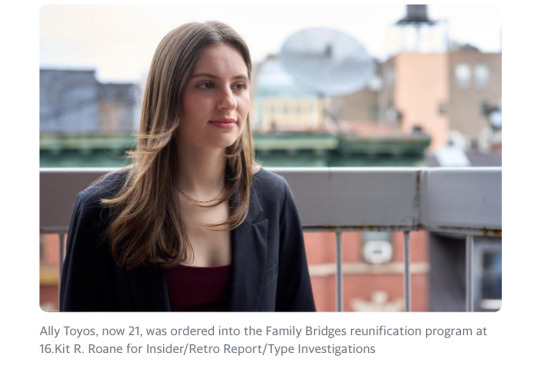
Ally Toyos was a 16-year-old in Kansas when she was taken from her mother five years ago. In an interview, she said she and her then 14-year-old sister tried defying the Family Bridges moratorium, telling Rand and his colleagues that their dad had abused them. (Toyos' mother said a court order prevented her from speaking with the press; Toyos' father didn't reply to interview requests.) Threats ensued, Toyos said. The girls were told that if they didn't comply, they could be separated, sent to wilderness camps, committed to psychiatric facilities, and cut off from their mom for the rest of their childhoods, according to Toyos.
Much of the Family Bridges workshop involves watching and discussing videos, program documents show. One of them, "Welcome Back, Pluto," tells the fictional story of a petulant teen who scorns her father. "If you're alienated, like Emily, you might get mad when others don't take your complaints seriously," a female narrator says. In time, however, Emily "learned to see things more clearly." She realized her complaints were "exaggerated," the narrator explains, and "sounded just like her mother's."
According to the video, which was scripted by Richard Warshak, a psychologist who helped develop Family Bridges, some children who steadfastly reject a parent "suffer for the rest of their lives."
Other materials warn children against trusting their memories. Toyos, whose workshop took place at the C'mon Inn in Bozeman, Montana, said she was shown a 2013 TED Talk by Elizabeth Loftus, a psychologist who developed the idea that memory is malleable and who has served as a defense witness in high-profile trials, including Harvey Weinstein's. Memories are often contaminated by outside influences, Loftus warns in the talk, which leads to false accusations that can ruin lives.
Insider and Type spoke with or reviewed statements by 17 youths ordered into Family Bridges, Turning Points, or other reunification programs. Their accounts of the workshops were broadly similar. Hannah Rodriguez, then a 16-year-old living in Tampa, Florida, said her workshop, in 2016, was held at Linda Gottlieb's home in New York's Hudson Valley. Gottlieb, the author of a book on parental alienation syndrome, had founded Turning Points about two years earlier. Rodriguez said Gottlieb's office was right off the living room, where her husband spent his time in a recliner. Every day, Rodriguez could see him and hear his TV shows, she said.
Rodriguez, Toyos, and several other former participants said the workshops plunged them into depression.
In spring 2022, one 13-year-old girl got so distressed during a session with Gottlieb at a hotel that she banged on a wall and screamed for help, court papers show. Someone called the police, who brought her to a hospital for a psychiatric evaluation. "I just want my mom," the girl said, according to hospital records, but under the court order she couldn't call her. She was held at the hospital for three days.
In a written statement that Montes said he later dictated to her, Robert said he became suicidal. "The only thing that stopped me from throwing myself off the balcony was the 24/7 surveillance," the statement reads. "I never thought so many people would be that horrible, controlling, and manipulative towards little kids."
At the end of the workshop, Robert went home with Winenger and had "horrible, weird depressive anxiety episodes," according to the statement. In early February, he was admitted to the psychiatric ward of a children's hospital, according to court records.
Repeated emails to Rand were met with an auto-response saying he was "on sabbatical." The psychologist managing Family Bridges in his absence, Yvonne Parnell, declined interview requests, as did Gottlieb. Gottlieb forwarded Insider's queries to a lawyer, Brian Ludmer, but Ludmer said he couldn't speak for her. Neither Parnell nor Gottlieb replied to detailed written questions.
Lynn Steinberg said her program One Family at a Time, based in Los Angeles, has treated some 50 families over the past eight years. A family therapist, she's the author of "You're Not Crazy: Overcoming Parent/Child Alienation." She was the only program director who agreed to talk.
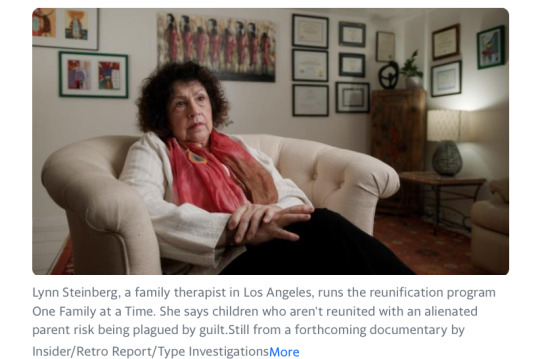
She said she begins each workshop by listening to the children and taking down every accusation they make; she then works to achieve "an agreement between parent and child." After those conversations, she said, the children are dramatically transformed. They apologize and cry, she said; they kiss and embrace the parent they'd rejected, even sitting in the parent's lap. They're eager to make up for lost time, she said, and can't wait to see long-lost kin.
Daniel Barrozo, of Chino, California, said Steinberg's workshop was a "tremendous help" to him and his daughter in 2021. Steinberg successfully challenged his daughter's misperceptions about him, he said. When Steinberg asked her what he'd done wrong and what she hated about him, his daughter simply looked down and cried, he said. "The whole time, she had nothing to say, because Mom was the one speaking for her," he said. Now, he said, his relationship with his daughter is stronger than ever.
Steinberg said her own mother alienated her from her father, a realization she reached only after his death. She called her ex-husband an alienator, too, saying her adult daughters reject her to this day. She regrets that they didn't get help from a program like hers.
Left untreated, alienated children "fail at relationships" and risk developing eating disorders, drug addiction, depression, gender dysphoria, and other ills, Steinberg said, citing her clinical experience.
But an increasing number of scholars are criticizing the programs. Jean Mercer, an emeritus professor of psychology at Stockton University, is the author of recent papers on parental alienation. One examined six reunification programs, including Family Bridges and Turning Points, and found that the research evidence supporting the effectiveness of the programs "has few strengths and many weaknesses." For another paper, Mercer reviewed the scholarship on the programs and statements from five youths who'd attended them. She found that the programs "may contain elements of psychological abuse."
Another study, by Michael Saini of the University of Toronto, examined 58 empirical papers on alienation and its treatments and found the body of research "methodologically weak." While some divorcing parents exhibited "alienating behaviors" and some children rejected a parent, the nexus between those phenomena hadn't been proved, Saini found. Moreover, he found the studies hadn't shown that interventions worked.
Following the workshop, the programs commonly assign children to a specially trained aftercare therapist. Meanwhile, the exiled parent undergoes reeducation.
Insider obtained audio of a call last year between Gottlieb and the mother of a 14-year-old girl and a 12-year-old boy in Turning Points. "I think what you did is criminal," says Gottlieb, who, like Steinberg, has publicly stated that her own mother alienated her from her father. There was "no reason" the children shouldn't have a relationship with their father, Gottlieb says in the recording, and "you have failed miserably to require it."
"That's alienation," she says. "That is what you are guilty of, and it's child abuse." For the children's sake, the woman must "make amends," Gottlieb says. Otherwise, "I will recommend extending the no-contact period until they're 18."
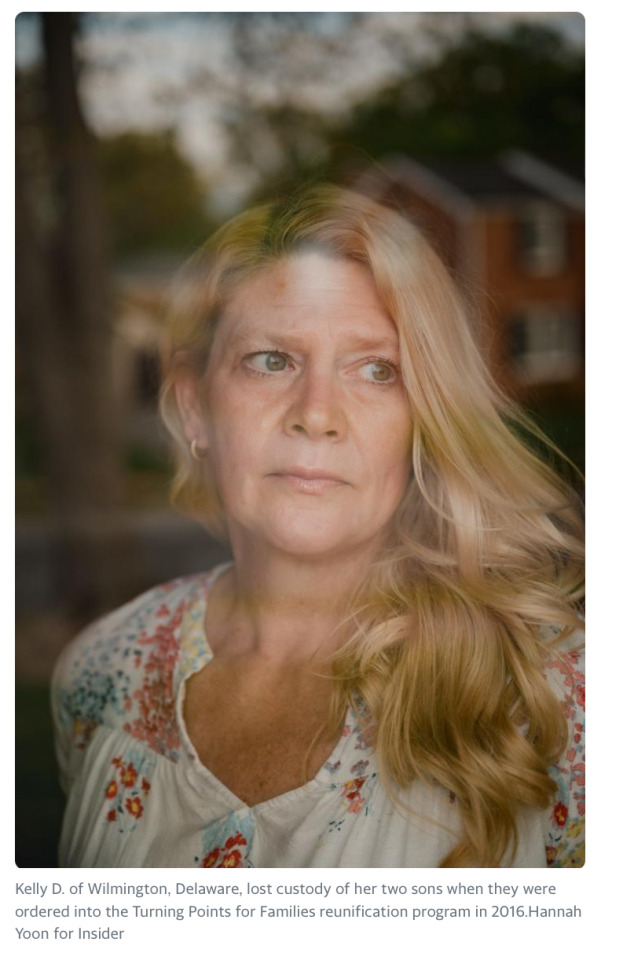
Insider and Type interviewed 12 mothers whose children were sent to Turning Points, many of whom said Gottlieb rebuked them over the phone and in emails. Most said they were required to write letters to the kids praising their fathers and submit them to Gottlieb for approval.
In early November 2016, Gottlieb told Kelly D. — Ashton and O.'s mother — that her letters contained superfluous details and secret messages and needed to be redone. In the end, Kelly submitted several drafts for each of her sons, all of which Gottlieb rejected.
"She sets a bar," Kelly said. "You try to reach the bar. She sets the bar higher."
Judge Ostroski had ordered Kelly to find a therapist "acceptable to Ms. Gottlieb" who would help her support Michael's relationship with the children. From a list provided by the Delaware Family Court, Kelly chose a psychologist, William Northey. But Gottlieb warned in an email, "I cannot approve him before I speak with him about his specialized knowledge of alienation."
The conversation went poorly. Gottlieb considered Northey unacceptable, she later testified, and Northey found fault with Gottlieb, too. He sent her a letter, reviewed by Insider, criticizing her for calling Kelly a "sociopath" and for using the phrase "parental alienation syndrome," which, he wrote, "is not a recognized diagnostic term."
Meanwhile, Gottlieb was making demands of Ashton and O. Shortly after they returned from New York, according to an email to both parents obtained by Insider, Gottlieb determined that they needed to transfer schools immediately, as their current schools had "actively undermined" their relationship with their dad.
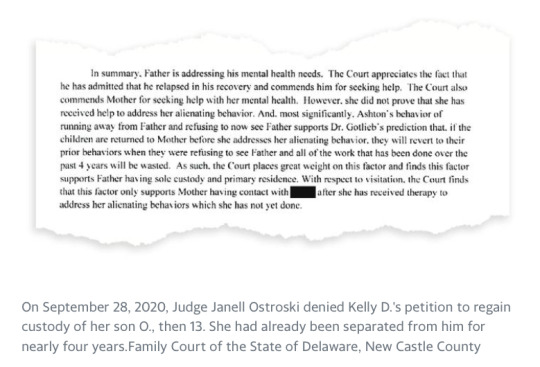
She sought custody of O., too. But in September 2020, Ostroski found that Kelly still hadn't been properly treated for her alienating tendencies and denied her petition.
For now, even visits were too risky, Ostroski concluded.
"Ashton's behavior of running away from Father and refusing to now see Father supports Gottlieb's prediction that, if the children are returned to Mother before she addresses her alienating behavior, they will revert to their prior behaviors when they were refusing to see Father and all of the work that has been done over the past 4 years will be wasted," Ostroski wrote in the ruling.
'Junk science'
In June 2010, more than a thousand mental-health practitioners, lawyers, and judges gathered at the Sheraton in downtown Denver for the annual conference of the Association of Family and Conciliation Courts, which unites players in the child-custody field from around the world. The theme that year was "Traversing the Trail of Alienation," and over four days the condition was discussed in more than 30 sessions. Participants could learn how to spot an alienating parent, when it was best to defy a child's wishes, and what might help an alienated child heal.
The event signified a remarkable embrace of an idea whose author had been consumed by scandal and tragedy just a short time earlier.
In the late 1990s, critics of Gardner's dealt a powerful blow to his credibility by unearthing writings in which he'd defended pedophilia.
"Sexual activities between an adult and a child are an ancient tradition," he wrote in a 1992 book.
As a product of Western culture, he viewed pedophilia as reprehensible, he wrote, but it may not be "psychologically detrimental" in other cultures. The following year, in a journal article, Gardner argued that from an evolutionary standpoint, children benefited from being "drawn into sexual encounters," since these experiences steered them toward early reproduction. "The Draconian punishments meted out to pedophilics go far beyond what I consider to be the gravity of the crime," he wrote in 1991 in "Sex Abuse Hysteria: Salem Witch Trials Revisited."
In May 2003, at age 72, Gardner dosed himself with painkillers and stabbed himself to death. His son told reporters he was driven to suicide by chronic pain that had recently worsened.
In the assessments of his life that followed, Gardner's work was lambasted by prominent psychiatrists, including Dr. Paul Fink, a past president of the American Psychiatric Association. "This is junk science," Fink told Newsday in July 2003. "He invented a concept and talked about it as if it were proven science. It's not."
The theory could have died with Gardner. Instead, it gained ground.
In 2001, Richard Warshak, a clinical professor of psychology at the University of Texas Southwestern Medical Center, published "Divorce Poison: Protecting the Parent/Child Bond From a Vindictive Ex." The book, released by HarperCollins, brought parental alienation theory to a wider audience — and made it more palatable. Unlike Gardner, Warshak spoke of alienation in gender-neutral terms, saying many fathers were programmers, too, and he likened the no-contact period between children and their preferred parent to study abroad.
Warshak started leading workshops for Family Bridges around 2005 and eventually became its unofficial spokesman, a role in which he excelled. In 2010, he appeared in "Welcome Back, Pluto" and published an influential article about Family Bridges in the AFCC journal.
In that study, Warshak reported on outcomes for the 23 children he'd worked with in the program so far. During the four-day workshop, 22 of them recovered a "positive relationship" with their rejected parent, he observed, including recalcitrant teens.
After the workshop, however, four children regressed, Warshak wrote, following what he called "premature" contact with their preferred parent. The program worked best, he said, when this contact was blocked "for an extended period of time." Warshak didn't respond to interview requests.
Meanwhile, another Gardner successor, Dr. William Bernet, a professor of psychiatry at Vanderbilt University, was working to push alienation theory forward. He submitted a proposal to the American Psychiatric Association to include "parental alienation disorder" in the next version of its Diagnostic and Statistical Manual of Mental Disorders, or DSM, and authored a scholarly article making the case for inclusion. He submitted a similar application to the World Health Organization, which was revising its International Classification of Diseases.
Bernet declined a request for an interview. But in a 2010 book, he wrote that since alienation scholarship had advanced in the wake of Gardner's death, "there is no need now to dwell on the details of what Richard Gardner did or said or wrote."
At the AFCC's conference in Denver in June 2010, Warshak was given a platform to discuss his Family Bridges paper, as was Bernet, to describe his DSM bid. Other presenters staked out a more moderate stance, arguing that while alienation was a pervasive problem, there was insufficient research to support construing it as a mental illness or ordering extreme interventions.
A few alienation opponents presented, including Joan Meier. But she said she flew home to Washington in tears.
"Everywhere I turned, alienation was the coin of the realm," she said.
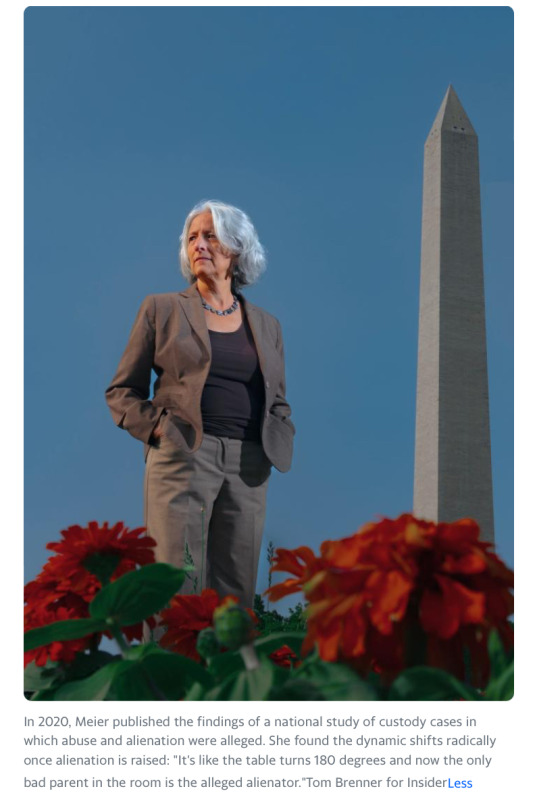
She set out to design a study that would document how women who alleged abuse were treated in family courts nationwide — especially when alienation was raised. The Justice Department supported the project with a grant of $500,000.
In 2013, the new edition of the DSM was released with no mention of parental alienation. And in 2020, the World Health Organization ruled that parental alienation was "not a health care term" and lacked "evidence-based" treatments.
Bernet and his colleagues simply regrouped. In court, they started calling alienation a "dynamic" or a "phenomenon" rather than an illness, which appeared to satisfy some judges. And Bernet incorporated the nonprofit Parental Alienation Study Group, a coalition of parents, lawyers, and therapists who collaborated on cases and research. Rand, Gottlieb, and Steinberg joined, along with hundreds of other mental-health practitioners involved in custody work. Many, like Steinberg and Gottlieb, claimed to have experienced alienation themselves.
Meier assembled her own research team, comprising a statistician, three social scientists, and two assistants, to conduct her large-scale study. In January 2020, just weeks before the WHO decision, the results were published in the Journal of Social Welfare and Family Law.
The stark findings shocked even her.
Most trial-court rulings in custody cases are unpublished, but Meier's team identified 15,000 rulings involving abuse or alienation that were published electronically from 2005 to 2014. After winnowing that dataset to cases in which the only parties were two warring parents — not, for example, a child welfare agency — the team was left with 4,300 rulings. There were nearly 2,200 cases in which a mother had accused her ex of spousal or child abuse, and in 10% of these, the father had fought back with an alienation claim.
In general, judges were hesitant to credit mothers' abuse claims. When alienation wasn't raised, judges credited these claims 41% of the time, Meier found, and 26% of the time, mothers lost primary custody.
For the 222 mothers whose spouses accused them of alienation, the picture was even grimmer. Women who alleged abuse and whose husbands accused them of alienation lost custody half the time — twice as often as women who weren't accused of alienation.
To Meier, one of the study's most staggering findings was how rarely mothers branded with the scarlet "A" were believed. In cases where mothers alleged child physical abuse and fathers cross-claimed alienation, judges credited mothers a mere 18% of the time, she found. And in the 51 cases where mothers alleged child sexual abuse and fathers claimed alienation, all but one mother was disbelieved.
For a father accused of child molestation, Meier concluded, "alienation is a complete trump card."
'The whole world is watching'
In January 2022, three months after losing her children, Montes chanced upon a sickening discovery.
In a cloud storage account she'd once shared with Winenger, she said, she found thousands of his photos and videos, including explicit images of their three shared children. She loaded them onto a thumb drive for the San Diego County Sheriff's Department, whose investigation into Winenger had never closed.
Within days, Winenger was arrested. He was soon charged with 19 felonies, including possession of child pornography and 14 counts of committing forcible lewd acts against a child, Robert.
He pleaded not guilty and was released on bail, his access to the children suspended. Because of the no-contact order he'd previously obtained against Montes, the children landed in a county shelter. Winenger's defense attorney, Patrick Clancy, declined to comment on Winenger's behalf, saying he doesn't try his cases in the press.
Suddenly, the custody dispute was transferred to juvenile dependency court, which meant Ratekin was no longer presiding. The new judge ordered the kids into their mother's care while the case was pending. On February 18, they came home.
At first, Montes said, the two youngest children were so scared of being taken again that they couldn't sleep in their rooms. She set up a big mattress on her bedroom floor.
Meanwhile, Joan Meier was using her research to make inroads with policymakers.
She'd worked with colleagues to draft a federal law that would incentivize states to protect children from abusers during custody disputes. They named the bill Kayden's Law, after a girl in Pennsylvania whose father murdered her during a court-ordered visit. During negotiations over reauthorization of the Violence Against Women Act, the child's congressional representative, Brian Fitzpatrick, got Kayden's Law in.
The legislation, signed into law on March 15, 2022, sets aside up to $5 million a year for grants to states if, among other measures, they mandate training for custody judges on abuse and trauma and prohibit them from ordering treatments that cut children off from a parent to whom they are attached. If enough states comply, the law could spell the end of the reunification programs.
Last summer, California was the first state to consider such a bill. It was introduced by state Sen. Susan Rubio of Los Angeles County, a survivor of domestic violence herself, after she heard from mothers who'd been accused of alienation and children who'd been sent to reunification programs.
Rubio's bill set off a battle that has since spread to statehouses around the country. Steinberg, the alienation therapist from Los Angeles, was a vocal opponent, arguing that men would be rendered powerless against false accusations. She was joined by fathers' rights groups and by the Parental Alienation Study Group, which was simultaneously pushing hard to discredit Meier's study. (Two prominent members of the group authored a studyconcluding that her findings could not be replicated, which Meier then rebutted.) After Rubio's bill passed the assembly unanimously last August, she was forced to withdraw it in the face of intense opposition from state judges over the training mandate.
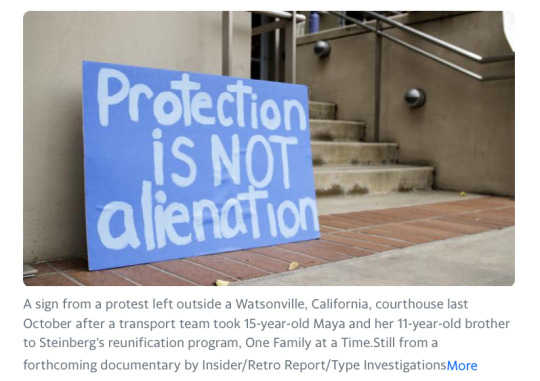
Then, last October, the momentum shifted. That's when Maya, the 15-year-old from Santa Cruz, told a custody judge that her mother had abused her and her brother. The judge, Rebecca Connolly, didn't believe her and ordered the children into Steinberg's program, cutting off contact with their father. The graphic video of the children being seized on October 20 was quickly viewed millions of times.
In response to an interview request, an officer of the Santa Cruz County Superior Court said Connolly could not speak about pending cases. Maya's mother has denied the abuse claims in court. Her lawyer, Heidi Simonson, declined an interview, citing court orders pertaining to "privacy and confidentiality."
On the heels of the viral video, a coalition of activists — many of them mothers accused of alienation — organized protests around the country. The first took place October 28 outside the courthouse where Maya had just testified. Standing on concrete risers and facing the building, a pack of Maya's friends demanded her return. "The whole world is watching!" they shouted. Protests also erupted in Michigan, Kansas, and Utah.
Rubio introduced a new bill, with modified judicial training requirements, in February. A similar bill passed both chambers of the Colorado legislature in April. One in Montana died in committee; its sponsor, Sen. Theresa Manzella, said she was up against a "deliberate distribution of misinformation" by opponents, including attorneys who use parental alienation as a legal tactic.
Montes said she's "cautiously optimistic" about Winenger's criminal trial, set to begin in June, and she hopes for an imminent victory in her custody case. Five years of legal bills have left her in debt and on food stamps, she said, but she considers herself lucky all the same. Almost every day, she talks to mothers who remain severed from their children.
Mothers like Kelly D., whose children were sent to Linda Gottlieb's reunification program in New York.
Kelly last saw her younger son, O., early on a Monday morning. It was a warm, sunny day, and she dropped him off at his best friend's house so they could shoot baskets before school. She hugged him, told him she loved him, and said she'd pick him up in the afternoon. Then she drove to court for a hearing.
That was six years, six months, and 24 days ago.
The reporting for this story is part of a forthcoming documentary from Insider, Retro Report, and Type Investigations.
If you are experiencing domestic abuse, you can call the National Domestic Violence hotline at 1-800-799-7233.
Read the original article on Insider
#USA#family courts#Child custody#abusers making themselves the victims#Parental alienation#Children being abused after the courts removed them from their mothers#Family Bridges#Dr. Richard Gardner#Reeducating children#Threat therapy#Long article#State sponsored gaslighting of children#Lynn Steinberg#One Family At A Time#Pathologizing abuse victims
844 notes
·
View notes
Text
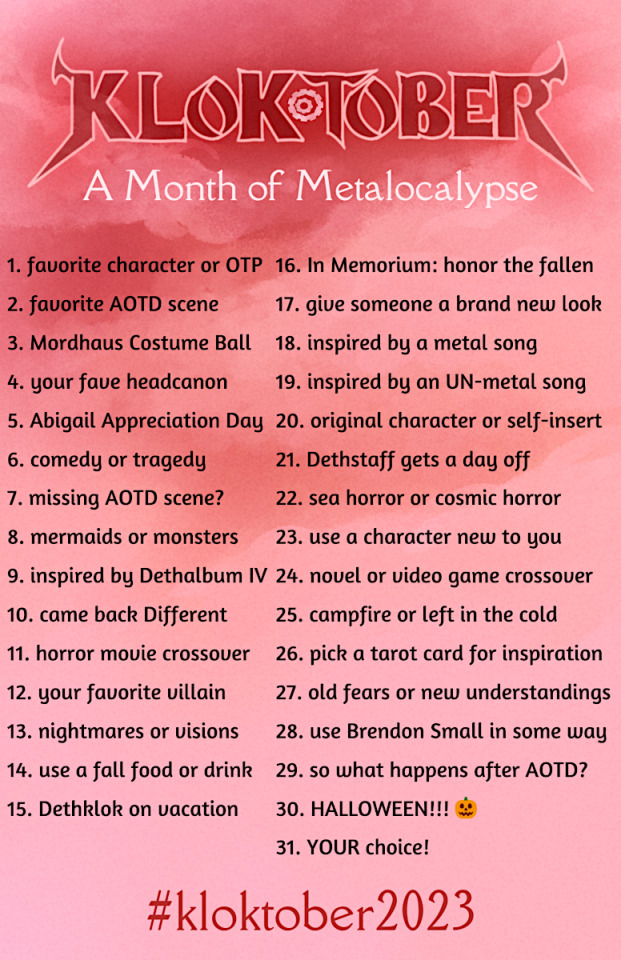
IT'S ABOUT THAT TIME, Y'ALL!! 👀
What is Kloktober?: An incredibly zazzy event taking place in October where we celebrate all things Metalocalypse. There’s a prompt for every day of the month to interpret as you see fit! Draw, write, paint, cosplay, make memes - all forms of participation are welcome!
How do I participate?: Make your totally brutal creation inspired by the day’s prompt and post it using the tag #kloktober2023 - it’s just that simple! Post it here, post it to Instagram, post it to AO3, post it to Twitter, wherever, go nuts!
Am I allowed to–YUP, ANYTHING GOES! There are no wrong answers during Kloktober! :D Your interpretation of a prompt is VALID. If you only want to do a few days, that’s VALID. Don’t burn yourself out, this is for fun! (Even I won’t be doing all of them, so don’t stress!)
What if I haven't seen the movie yet? No worries! If there's a prompt that doesn't suit you, please feel free to reach back in time and choose a prompt from a previous year's Kloktober (2022, 2021, or 2020). And as always, if you have any questions about anything, hit me up!
(plain-text list of prompts below the cut)
1. favorite character or OTP
2. favorite AOTD scene
3. Mordhaus Costume Ball
4. your fave headcanon
5. Abigail Appreciation Day
6. comedy or tragedy
7. missing AOTD scene?
8. mermaids or monsters
9. inspired by Dethalbum IV
10. came back Different
11. horror movie crossover
12. your favorite villain
13. nightmares or visions
14. use a fall food or drink
15. Dethklok on vacation
16. In Memorium: honor the fallen
17. give someone a brand new look
18. inspired by a metal song
19. inspired by an UN-metal song
20. original character or self-insert
21. Dethstaff gets a day off
22. sea horror or cosmic horror
23. use a character new to you
24. novel or video game crossover
25. campfire or left in the cold
26. pick a tarot card for inspiration
27. old fears or new understandings
28. use Brendon Small in some way
29. so what happens after AOTD?
30. HALLOWEEN!!!
31. YOUR choice!
#metalocalypse#kloktober#kloktober2023#i know i reuse the same basic instructions every year lol...#i'm EXCITED YOU GUUUYYYYSSS
355 notes
·
View notes
Text
☆ the wrong way to hard launch | band profile
the band :
empty bottles AKA EB are an australian pop-rock band based in california, usa. they released their debut album 'overtime' in july of 2019 signed under UMG. their first international tour, the overtime world tour began from november of 2019 but was later cancelled due to the covid-19 pandemic; the tour was supposed to end in august of 2020. they released their second full-length album 'twelve more days' in september of 2022. their second world tour, the twelve more days world tour opened in melbourne on march 21, 2024 and has a current closing show set in los angeles on january 17, 2025.
official accounts:
↳ instagram: emptybottles_official
↳ twitter: EmptyBottles
management accounts:
↳ instagram: emptybottlesbar
↳ twitter: theemptybottlesbar
the members :
SELINA 'LINA' BUI 🩷



frontwoman of the band
plays lead guitar, also knows how to play drums and piano
main songwriter/composer
born 24 september, 2001
oscar's gf and zhou guanyu's cousin
main face claim: cheng xiao
usernames:
↳ instagram: selinabui
↳ twitter: EB_selina
LUKAS 'KAS' ZHANG ❤️


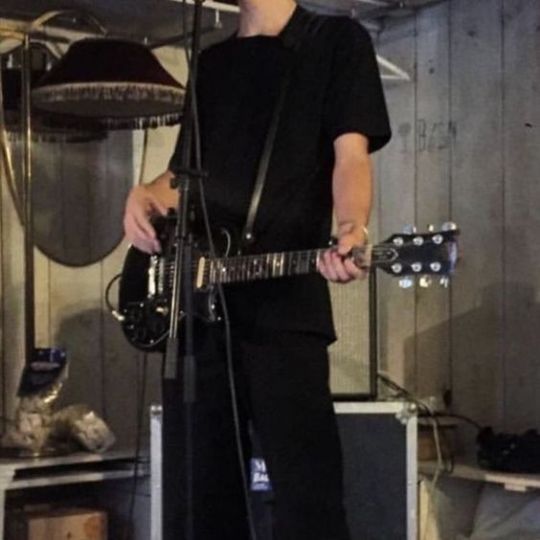
lead guitar of the band
also can play bass
secondary songwriter
grew up next door to lina
gets shipped a lot with lina but they mostly have a sibling relationship
born 28 march, 2001
main face claim: wang yibo
usernames:
↳ instagram: lukaszhang
↳ twitter: EB_KAZ
CAMELIA 'CAMI' YANG 💜
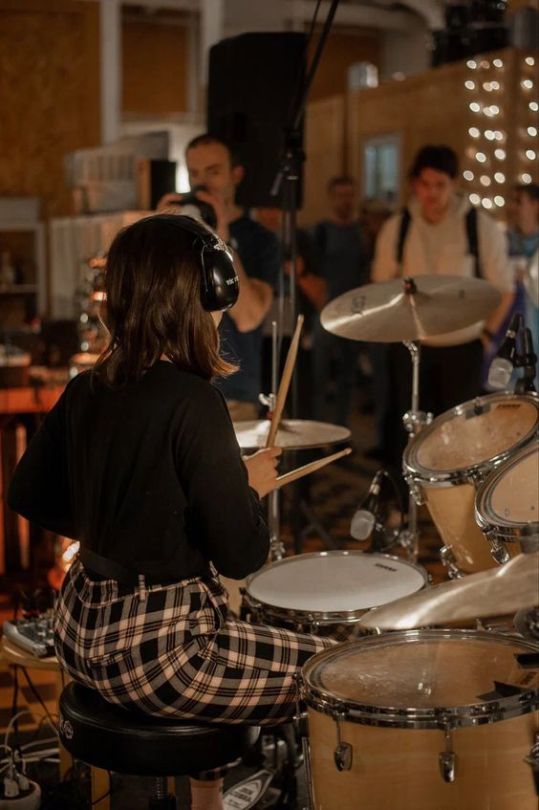

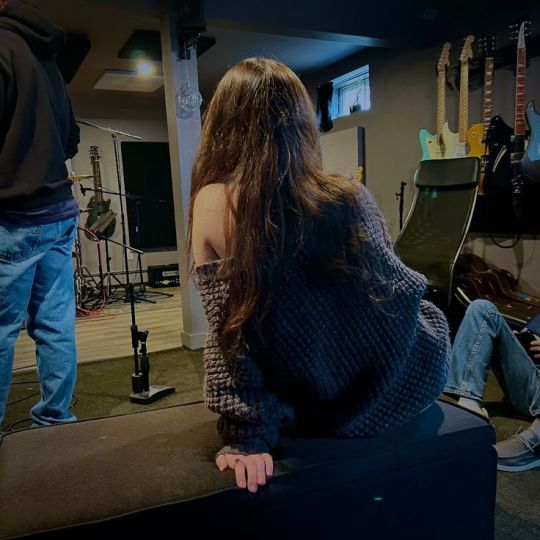
drummer of the band
also subvocal/backing vocals
graduated a year after her cohort bc of family stuff when she was still a kid
born 9 october, 2001
main face claim: n/a
usernames:
↳ instagram: cameliazzz
↳ twitter: EB_Cami
JONATHAN 'JONNY' SU 💚
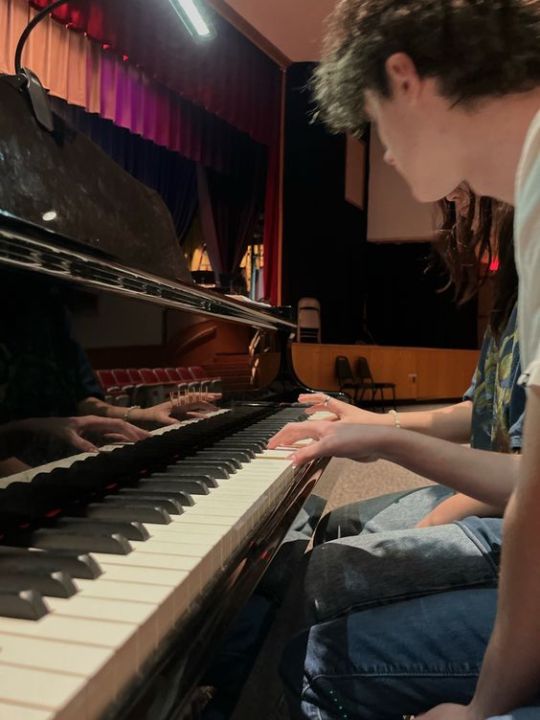


keyboard of the band
can also rap but literally none of their songs need him to rap
secondary songwriter
met kas through school and soccer
born 13 may, 2001
main face claim: xu kai
usernames:
↳ instagram: eb_jonno
↳ twitter: EB_Jonny
AIDAN 'AID' PARK 🩵



bassist of the band
also knows guitar but prefers staying near the back of the stage
the second 'pull' of the band; he's the pretty boy bassist people come to watch
graduated a grade above the rest of the band (excluding cami)
born 7 june, 2000
main face claim: n/a
usernames:
↳ instagram: aidan_ebass
↳ twitter: EB_Aidan
#f1#oscar piastri#oscar piastri x oc#oscar piastri x reader#oscar piastri fanfic#oscar piastri imagine#oscar piastri smau#formula 1 fanfic#formula 1 smau#f1 fic#f1 smau#f1 imagine#f1 social media au
76 notes
·
View notes
Note
Hey! Hope everything’s going good! Was thinking if bandmember did anything like the vanity fair Billie eilish videos when they watch back all those interviews. Would love to see how far our girl has come
YN YLN: Same Interview, The Sixth Year | Vanity Fair
A/N: Christmas break is coming up so been busy but I also have some stuff coming out soon for your lovies! 💚
SINCE 2010 masterlist

“Year six, baby,” YN smirks at the camera. “Alright—” She pulls on the tops of her pink sheer opera gloves that match her pink corset before clapping her hands together. “—Let’s do this. ‘Ello, m’name is YN YLN. Today’s date is October 18, 2022.”
How old are you?
“I’m 23 years old.”
“I’m 24.”
“25.”
“26.”
“27.”
“M’28 years old,” YN kisses her teeth. “M’pushing 30, mate.”
How many followers do you have on Instagram?
“I have 573K followers on Instagram.”
“8.7M.”
“60.9M.”
“94.8M.”
“106M.”
“I currently have 287 million followers on Instagram. Dunno why I have so many; I make a lot of shit posts.”
What is your most liked picture on Instagram?
2017:
“My most liked picture is one of me and the boys huddled up backstage after our last performance together with 654K likes.”
2019:
“It is a picture of me in my home recording studio with about 5 million likes.”
2022:
“It’s currently one of me photo dumps on tour. The first picture on that one is a selfie with Harry taking a bite out of m’cheek. This one has 60,036,819 likes. Which is way too many likes if m’being honest.”
How are you feeling today?
2022:
“M’feeling really good. I always look forward to these interviews. I try me best not to look at the old videos more than once so that I can best prepare meself for my current answers, yeh know? But I love that I get to do this every year. There’s a lot of like, time lapse compilation videos on meself on YouTube that show off how far I’ve come over the years but these I feel are the least cringy ones,” YN lets out a laugh.
Biggest thing to happen in your career?
2021:
“I won a Grammy for producer of the year?” YN furrows her eyebrows as she juts her chin out. “Wha’ is life? That’s insane. The highlight of me career. Hands down.”
2022:
“It’s still the highlight of me career. And I got nominated for it again for Grammys 2023. To even be nominated and be the only woman in this category a second year in a row is just super fookin’ wild. Um...I got seven other Grammy nominations for next year. I’m also on tour again—a world tour—and it’s definitely me favorite thing to do aside from making the actual music. Harry’s new album that we’ve been workin’ on for over the past two-ish years finally came out earlier this year. I’m dropping me third album before the year is up. So many good things have happened this year that it’s honestly too long to list.”
How often do you get recognized in public?
2017:
“Pretty often,” She nods her head, a chuckle pushing past her lips. “It’s pretty hard to just go out and grab a bite to eat without getting surrounded.”
2020:
“Public? Who is she? I dunno her,” YN teases. “It’s pretty rare that I’ll go out nowadays and the masks only help so much with trying to be lowkey on the street on stuff like tha’.”
2022:
“I have to admit, v’gotten a lot better at being discreet when going out in public,” She nods her head with a knowing smile. “I think I was just so used to not being ‘allowed’ to go outside or if I did I wouldn’t enjoy meself because I knew I was gonna get recognized by paps. It was really hard for baby YN there because of how everything started. Everything I did was in the public eye and no matta’ what I did, me fans always knew where I was at all times it seemed,” YN hums.
“I love me fans and I love the times when we happen to see each other on the street, we can have like a genuine conversation instead of shoving yeh phone in me face and putting yeh hands on me without me permission. I’ve had the most amazing conversations with fans like tha’ those moments are super special to me.
But in all honesty, they need to get hired by the FBI or somethin’. Knowin’ where m’gonna be before I even do,” She huffs out a chuckle.
What’s most important to you right now?
2020:
“The relationships within me life. I think this year has really made me recognize that. Whether those relationships are with me mum, me boyfriend, me tour team, me dancers, the fans—they’re all super important to me. Makin’ sure that we’re all safe and healthy—mentally and physically—now more than ever.”
2022:
“All of which are still very important to me. I think v’also learned to stay in touch with me emotions. I think in an industry like this, it can be very easy to just put on a mask or passively go through events to maintain an image. If I’m doing something—wether it be somethin’ major or not, I want to allow m’self to be in the moment.
I did a show recently in Austin and...” The crease between her eyebrows disappear and smile etches itself on her lips at the memory, “I was singing POV and I just stopped singing and the crowd took over. I quite literally just stood there, took out me earpieces and just listened to a stadium full of people sing my song back to me. It made me feel so...it made me feel really good, really happy.”
Do you feel pressure?
2017:
“I do yeah,” YN nods with a sincere furrow of her eyebrows. “But I have been feeling pressure for the majority of my career so I’m mostly used to it by now; It doesn't bother me as much anymore.”
2022:
“Of my fookin’ word,” She throws her head back. “I can’t even—like even the way I spoke, man. Can yeh hear that? Like, I was still in the mindset of having to change the way I talk, tweak me accent and act all prim and proper,” YN points a finger into her mouth as she sticks out her tongue.
“And what a lie. Like of course that pressure bothered me still! I was fresh into the hiatus, just dropped me first solo album, about to do a world tour by meself for the first time. I was dealin’ with so much that I remember the pressure of everything was just...it felt that I was gonna be squished into a pancake. Being in the band and being as big as we were, there was an immense amount of pressure for everything to keep going well; everything seemed like it had to get bigger and bigger and if I didn’t live up to that standard as a solo artist, it was the end of the world to me.”
“I do still feel some pressure but definitely not to that extent anymore. It’s more of like, a good pressure, I’d say. It keeps me from resting on me laurels and it makes me continue to work hard to improve meself. Like, just because I won an award for produce of the year doesn’t mean that m’gonna let it get to me head and just not work to better meself in that craft.
But I have to admit that a lot of that pressure has been lifted off of me from me fans. They’ve just continued to give me their unconditional love and support—whether it be for a year, 2 years, 12 years—m’just super grateful that they just allow me to be me, flaws and all.”
What did you eat today?
2020:
“I ate some grilled chicken—that I made all by myself—with a side of some beans,” YN giggles as she knows by now that the fans have been having a laugh about her boyfriend’s baked beans comment over interviews in quarantine.
2021:
“I had a chicken caesar salad bowl that I probably put way too much dressing on to be considered healthy anymore,” She chuckles, playing with the chunky chain sitting on her collarbones.
2022:
“I actually had an amazing chicken wrap this morning. Just the right amount of protein and yumminess,” She pats her tummy with a content smile. “Yeh girl likes chicken, what can I say?”
Are you aware of people when you're playing?
2019:
“I think so yeah. It’s crazy because for me, it’s scarier to play in front of 6 people than 60 thousand people. But on the other hand, the noisiness of big crowds is super calming to me. I can’t really explain how. Like right before m’gonna go on stage, I like to take out me ear-pieces and just listen to them scream...which now makes me sound like a serial killer of summ’wat,” YN’s shoulders bunch up to her ears as she giggles.
2022:
“I would say that m’more aware of the audience members now more than I ever have before. This current tour that m’on is probably the funnest tour so far and it’s really because of the fans. When m’on stage and when I’m performing, I make sure to look at the people in the audience, yeh know? Like, I can still remember when the band did our first stadium tour, I honestly couldn’t see anything; they were all just blurbed together.
But with this tour, I make sure to take the time during the show to talk with fans. And I make an effort to sing to them and look at them dancing in the pit, the outfits they recreate, the way some of them are just closing their eyes and just being in the moment. As a musician, to see people come to me show and to see how they create this environment where everyone can have fun and let loose and just have a good time is just super amazin’. It’s a really indescribable feeling.”
Are you more confident this year compared to last year?
2018:
“From last year to now? 100%,” She answers with ease, leaning back into her seat. “I think this is the most confident I’ve ever felt, I think. M’not too worried about what people are sayin’ about me because let’s face it, they are always saying something. So if yeh like me, cool. If yeh don’t, cool.”
2022:
“She’s not wrong. 2018 YN’s ego was pretty up there. Granted, me ego is still growing and sensitive so—” YN shamelessly shrugs and puts her hands up in defense. “—Take tha’ as you will. But I definitely feel more confident and secure in who I am as a person and as an artist. When the boys and I went our separate ways musically, I had a hard time sort of, figuring out what I like and the kind of music I wanted to make for meself. Even the way I thought about fashion, I knew people saw me in skirts and things like that but I remember entertaining the idea of if I wanted to continue that as a security blanket of sorts.
When I was in the band, I took things with a grain of salt and m’very happy that I’ve kept that with me.”
Biggest rumor about you?
2017:
“That I’ve slept with each of the 1D boys,” YN lets out a nervous laugh. “Which is gross because they’re all like my brothers.”
2018:
“Where do I even begin?” YN blows out a raspberry. “I’ve been gettin’ this one for literally years now but that m’dating my old bandmate, Harry—which is getting really old at this point,” She scrunches up her nose with a roll of her eyes.
2022:
YN bursts out laughing as she watches her old self answer, knowing full well that during that time period she was in the midst of her on-and-off relationship with Harry.
She tilts her head to the side with a quick raise of her eyebrows, “I mean, she’s not wrong. V’been getting that question/comment asked since we were on the XFactor. And believe it or not, I still get asked that question. I just answer it differently now,” She cheekily brings her shoulder to her chin.
What do you hate being asked?
2018:
“That. The ‘who are you dating?’ question. For a long time, I just had to suck it up and just answer the question but I don’t have to answer if I don’t want to, y’know? Also, I’m my own person,” She begins to list things off of her fingers, “I’m not someone’s arm candy, m’not so-and-so’s new girl. I’m YN YLN and if all you ask me is if I’m dating anyone rather than me music, you don’t deserve my time.”
2022:
YN drops her jaw and the corners of her lips tug up in a smile.
“A feisty little thing she is,” She chuckles. “But no truer words have ever escaped me mouth. She’s right, and I still stand by that. 100%. My career is not based around a guy or who m’dating. That’s not to say I hate talking about Harry—I love to talk about him but don’t make it the whole point of the interview, yeh know?”
Craziest fan moment?
2021:
“Me first show back on tour after being held back in 2020 was really heartwarming. It a stadium show—not intimidating at all for me first show back—” YN sarcastically comments. “—so there were three levels of seating: the pit, the middle section, and then the top. While I was singing, the audience did a fan project where on the top section held up lights to read welcome back, and then the middle said we missed you, and the pit held up pieces of paper saying we love you. M’not even gonna lie, I was bawlin’ me eyes out. Like, just thinking of the amount of work that went into that...” She shakes her head in disbelief.
2022:
“I did a show last week in LA and at the barricade, I saw this lineup of these 5 girls wearing my current and past tour outfits. I have seen some really good recreation of me fits before and it was honestly like a copy and paste, I was so shocked. After talking with them for a bit—now I don’t ever do this—but I invited them to come up on stage with me,” YN laughs.
“I suggested we ditch the choreography for Kiss Me More but they insisted they knew it and sure enough,” YN throws her hands with another laugh. “I almost hired them on the spot!”
Do you have a boyfriend?
2017:
“Um, no. I do not have a boyfriend. I’m just really focused on my music at the moment. That’s my boyfriend,” She lets out a chuckle.
2020:
YN playfully rolls her eyes and throws her hands up, “Well I’d be the biggest liar in the world if I said no.”
She huffs out a giggle as she refers to the entire world finding out about her secret relationship with Harry on New Years Eve of that year.
2021:
“I do have a boyfriend,” She smirks at the camera with a shrug of her shoulder, leaving it at that.
2022:
YN takes a second longer to answer this question and stares at the laptop screen with a fond smile. She technically doesn’t have a boyfriend anymore, but will she let them know that? Nope.
“Well, you’d all be happy to know that Harry and I are still very much together. Still got that boy locked down, ladies,” She playfully winks at the camera with a click of her tongue.
What makes you happy in a relationship?
2022:
“I like quality time. From staying inside 24/7 in 2020 to easing back into my busy schedule made H and I realize that it was important to set some time aside for ourselves, just the two of us. Like, we don’t even have to be talking just as long as we’re together during the business of it all. And...” A smirk grows on her lips, “One of me love languages is physical touch. It definitely wasn't on the list before so you can probably guess who made me this way but yeah. And music, of course, that’s me main form of love language. Whether we’re listening to good music, making it, singing it—anything to do with it m‘in love.”
Describe your style in 3 words.
2017:
“Figuring it out.”
2018:
“No more skirts,” The 24-year-old rolls her eyes.
2019:
“Whatever is comfy,” She laughs as she wraps her light green cardigan tighter over herself.
2020:
“Trying new things.”
2021:
“Trousers and blazers.”
2022:
She tilts her head as she bites her lip, looking up as she thinks about how to compactly frame her style now. As she says the next three words, she holds up her hand to count it off on her fingers, “Pretty in pink. And 2018 YN was a lie. I still fancy a skirt every now and then.”
Biggest thing you’re struggling with?
2019:
“I think, just being honest with meself in terms of how I feel. I think I struggle a lot with allowing meself to feel the way I feel about certain things,” Or about a certain someone. “And that it's okay to feel those things. I know, super detailed,” She chuckles.
2022:
“Yeah, 2019 YN was certainly going through some personal issues. S’crazy to look back at these videos and remember wha’ I was feelin’ during that time. S’pretty crazy. I can say that v’grown immensely from that time of my life which is very comforting to know. It’s still hard for me, don’t get me wrong, but allowing myself to feel things like love or sadness or happiness is something that I’m subconsciously reminding myself to do.
I think the biggest thing that m’stuggling now with is to have check ins with meself. It’s safe to say that m’back to my busy, hectic, never-ending schedule so I want to take a breather every now and then. It can be a whole day, a whole 20 minutes, just a pause to check in with my mind, me body, me spirt to make sure m’okay and then be off to a career that I love very dearly.”
What advice would you give your future self?
2017:
“Have some fun and enjoy this new chapter that you’re venturing onto,” She nods with a smile.
2019:
“I would say to allow yourself to feel uncomfortable. Step out of your comfort zone and take that leap of faith.”
2022:
“What a genetic piece of advice for that first year, eh?” YN chuckles with a smirk, “Enjoy this new chapter you're venturing onto like yeh can hear how professional I wanted to sound,” She playfully rolls her eyes with a sigh. “I would say that 2019 YN’s advice is a good one though. It’s a good reminder to not play things safe all the time. As a narcissist, I want everything to be perfect, especially me music, so to be in the studio and not fall back to me old habits of what I think sounds good, try something different, yeh know? I like that a lot, actually.”
This is my mum...
2017:
“Everyone, say hello to Penny,” YN proudly presents as her stepmum comes up to her side, placing a hand on the back of her chair as she waves at the camera.
“‘Ello, lovelies,” Penny beams.
2018:
“Penny!” YN smiles brightly. When she wiggles her fingers towards her stepmum the sound of her rings clinking together can be heard.
When Penny walks up to her stepdaughter’s side, she puts her hands on top of YN’s red leather jacket to give her shoulders a squeeze.
“Hi baby,” Her stepmum gives a warm smile and gently presses her chin to YN’s temple.
2019:
Penny tucks her long, black hair behind her ears before wrapping her arms around her stepdaughter’s shoulders.
“I love you, my baby,” She says into her hair before planting a kiss on her head.
“I love youuu so much,” YN sings as she holds onto her stepmum’s forearms over her chest.
2020:
“Y’already know what time it is,” YN dances in her seat, her arms already extended out by her side. She lets out a laugh as she watches Penny shimmy her way to her stepdaughter’s side. The tight high waisted jeans show off her curvy, fit figure and a mask covers the lower half of her face.
“It’s Penny time,” Her stepmum throws finger guns at the camera.
2021:
“Come over ‘ere, mum,” YN nods her head over to Penny. Once she’s close enough, she takes a hold of her stepmum’s hand and pulls her over for her to sit on her lap, wrapping her arms over her torso, “Love you.”
“I love you more, baby,” Penny smiles as she leans her head back to rest beside YN’s.
2022:
“This is me mumma,” YN smiles warmly before cooing out a chuckle. “Wha’ happened?” She questions when she sees Penny walk over to her side with glossy eyes.
“Sorry, m’sorry,” She chuckles, dabbing her under eyes with the sides of her index fingers. “S’just really fookin’ cool to see how far you’ve come. Like look at her—” Penny points to the laptop screen that has 2017 YN on display. “—me lil’ baby.”
“Mum!” YN laughs when Penny wraps her arms around her daughter’s head and pulls it to her chest.
Taglist:
@wobblymug @be-with-me-so-happily @ashtongivesmebutterflies @kiwiskiwiskiwi @darlingdesire @obsesseddd @hopefulwastelandcreation @cacapeepee @breezie-b00 @harrysfolklore @theekyliepage @sunshinemoonsposts @nervousspiderling @tbslonelyhes @tenaciousperfectionunknown @harrystylesrecs @certified-nalayak @itsjustsel @iknowyouthinkimbulletproof @gviosca @behindmygreyeyes @twobluejeans @allisonxmcu @theemeraldbutterfly @jean-love @marvellover-sam @b-reads-things @reveriehs @rach2602 @thurhomish @perrypughstyles @luvonstyles @mxltifxnd0m @teamspideyman @c00chiemonster @juiceboxrry @s8tellite @folklorehrry @illicithallways @claramllera @eunoiaax @hoya122 @nichmedder @sleutherclaw @gloriousmoneyrascalbiscuit @harianaswhore @teawithcyb0rgs @vrittivsanghavi @vc55bughead @futuristiccroissantlampsludge @onecrazydirectioner @valluvsu @itsgabbysblog @awkwardbisexuall @rosehel @sucker4angstt @isalove @diorchives @mrshiddlestyles02
#harry x 1dbandmember!reader#since 2010 series#1dbandmember!yn#harry styles x reader#harry styles x you#harry styles x y/n#harry styles x singer!reader#harry styles and reader#harry styles and y/n#harry styles and you#harry styles and famous reader#harry styles fan fic#harry styles fanfic#harry styles fanfiction#harry styles fic#harry styles writing#harry styles fluff#harry styles album#harry styles masterlist#harry styles concept#harry styles x famous!reader#famous!reader#famous!yn#one direction fanfiction#one direction imagine
991 notes
·
View notes
Text
in another life

April 28, 2019
Clementine was leaning up against a wall around her IIHF U18 Team having completed the tournament early in the day and they were all hanging out in a empty hotel room, some playing cards or poker, some all huddling with their phones, a few half asleep on the floor, and some just talking and eating.
Clementine was leaning against the wall looking out the window showing the city of Sweden, she tensed as she felt an arm wrap around her shoulder before she smelt the cologne and slightly relaxed.
“Well hello gorgeous.” Braden Schneider greeted her with his flirty smirk.
“Schneider.” Clementine deadpanned, she has known him for a few years now, playing him multiple times a year in the WHL and being teammates for Team Canada and they have the same NHL draft class.
“Aww, no smile for me.” Braden sadly pouted poking at her cheek making her bit her lip to stop her smile hating how he has grown on her over the years, “I saw that.” He smugly grinned at his favorite girl.
“Shut up.” Clementine grumbled crossing her arms over her chest but not moving away from his arm.
“Never.” Braden promised with a smile looking around before discreetly pressing a quick kiss to her cheek, “I will see you later Clemsy.” Braden winked at her and is the only one to call her that.
Clementine cursed in her mind as she felt her cheeks grow hot.
Jamie Drysdale happened to see the interaction between his two teammates and walked over giving his friend a look.
“James don’t.” Clementine gave him a stern look back. Clementine and Jamie had quickly become quick friends within the first time they met and they seemed to just click.
“I wasn’t going to.” Jamie innocently smiled holding his hands up in defense.
“Mhm.” Clementine hummed not believing a word he said, knowing Jamie is very sweet but also looks very innocent meaning he easily gets away with anything.
October 6, 2020
Clementine was watching the rest of the draft after getting drafted number one to the New Jersey Devils.
She sat on the couch watching it with Connor as the rest of her family was outside celebrating still.
“The New York Rangers are proudly to select Braden Schneider.”
Clementine perked up slightly at the name and clapped with a small smile getting a teasing look from her younger brother which she ignored.
She pulled up her phone pulling up her texts with Braden, “Looks like we are rivals again.” She texted and shut off her phone letting out a chuckle at the coincidence.
The two having been rivals the last three seasons and now they are drafted to the two teams that have one of the biggest rivals in the NHL.
“It’s fate Clemsy :).” Braden texted back the second he had a free second and smiled at Clementine texting him.
Connor made kissing sounds seeing his sister smiling at her phone, Clementine elbowed him giving him a look, “Do not be a brat.”
Connor just smiled shaking his head.
December 19, 2020
Clementine put her hotel key against the door for her hotel room for the WJC and walked into the room and saw the bathroom light on and door closed and knew it was her roommate, she didn’t know who it would be but she only had a few people that rooms with her so she didn’t bother to find out exactly who it was.
She set her bags down on the floor next to the empty bed not hearing the bathroom door open and someone walk up behind her only when she felt arms wrap around her waist to spin her around.
She froze for a second before hearing an all familiar laugh and she relaxed into the backwards hug as he spun them around before setting her back down on the ground.
Clementine spun around turning to face Braden who was staring at her with a smile across his face, she wrapped her arms around his neck pulling him into a hug.
Braden smiled wider and hugged her tightly back.
The two started getting closer or rather Clementine started accepting her feelings for him and over the last nine months of being in quarantine they have facetimed and texted a lot and got a lot closer than they already were.
“Hi.” Braden whispered cupping her face, looking at her with a fond smile.
“Hi.” Clementine whispered back with a smile before she bit her lip and leaned up on her toes pressing her lips to his, Braden hand moved down to the lower of her back pulling her closer to him.
“Took you long enough.” Braden teased panting slightly as they pulled back.
“Shut up.” Clementine fondly rolled eyes whispering against his lips.
“Gladly.” Braden whispered before pressing his lips back against hers.
November 23, 2021
Clementine and Braden officially got together after they saw each other again at the WJC at the end of 2020 and their families weren’t surprised when they finally got together, they both kept their relationship private only family and some friends knowing not wanting anyone in their private life.
They loved being in a relationship and the two just fit each other so well, especially as Braden just seemed to bring out a more silly side of Clementine and they both experienced their first relationship.
But it was difficult, Clementine being in the NHL and having her rookie year and living in New Jersey and Braden switching between the AHL and WHL never having any time to see each other besides in the summer and they both knew it couldn’t work out forever.
He came to visit her for a few days having gotten a few days off and luckily so did Clementine.
Clementine rested her arm againt his bare arm laying in silence covered by a silk sheet feeling the slight cool chill in the room, Braden fingers were tracing her spine.
“I’m sorry.” Clementine whispered, she wanted a relationship to work with Braden, she really did. He was her first in a lot and she never regretted anything but she regretted how they just seemed to not be able to work out and how it just wasn’t easy.
“I’m sorry too Clemsy.” Braden kissed the top of her head, not only was she someone he had fallen in love with but she had become his best friend over the years and he hated that no matter how hard they tried they knew it wouldn’t work out between them.
They both deserved an amazing relationship and be treated the way they deserved and being in a long distance relationship and having schedules that don’t aline made it very difficult for that to happen.
“You are so gorgeous and i was lucky to be able to love you and to get the chance to be loved by you. You’re gonna find someone that it’s just easy with.” Braden held her face in his hands memorizing everything up close in case he never gets the chance again.
“And you are a totally asshole but you’re kind and funny and seem to light up a room no matter what, anyone will be luckily to have you B.” Clementine whispered back giving him a small sad smile and resting her forehead against his. Braden let out a small sad laugh.
They knew in another life they would’ve of worked out.
#clementinebedard#cb89#braden schneider#ny rangers#new york rangers#new jersey devils#alex holtz x oc#connor bedard x oc#connor bedard#jack hughes#luke hughes#quinn hughes#nico daws#nico hischier x oc#dawson mercer#simon nemec#jesper bratt#jamie drysdale#jack hughes x oc#luke hughes x oc#quinn hughes x oc#nhl x oc#nhl au
55 notes
·
View notes
Text
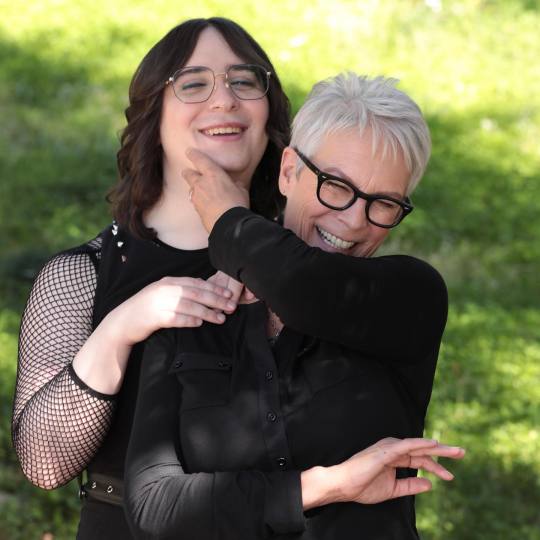
Pink News reports:
//Appearing on MSNBC’s Morning Joe on Friday (28 July) with host Joe Scarborough, [actor Jamie Lee] Curtis slammed the “demonisation” of trans people as “awful and terrifying”.
“This life is about love. Being a parent is about love, and I love Ruby. Love her.” Curtis said.
Ruby Guest came out as a trans woman in 2020, and she and Curtis gave an interview about their journey in October 2021.
Curtis told Morning Joe: “People have said, ‘You’re so great to accept her!’ [I say] what are you talking about?
“This is my daughter. This human being has come to me and said, ‘This is who I am.’ And my job is to say, ‘Welcome home.’ I will fight and defend her right to exist to anyone who claims that she doesn’t.”//
You can listen to what she said about her and Ruby in this video:
youtube
Photo: Instagram: @jamieleecurtis
190 notes
·
View notes
Text
‘What’s the worst that can happen?” That is what Georgia Harrison asked herself one Sunday morning in August 2020 when Stephen Bear, who lived opposite, invited her over for a cup of tea. They knew each other through the reality television and influencer circuits. She had been on The Only Way Is Essex (Towie) and Love Island; he had done Shipwrecked, Ex on the Beach, then won Celebrity Big Brother. They had hooked up before and he hadn’t treated her well.
“We’d been in lockdown and I was definitely quite lonely, feeling quite rubbish about myself,” says Harrison, 28. “I knew that going to Bear’s was a bad idea – there were two voices in my head. In the end, I thought: what’s the worst that could happen? Well, now we know.”
What happened was this: the morning cup of tea stretched into a long lunch washed down by tequila, followed by drunken sex in Bear’s back garden. The sex was different from how it had been in the past – more performative, with Bear carefully positioning Harrison in various locations. “It was more dramatic and lasted longer,” says Harrison. “I just thought he was having a good day.” Afterwards, to Harrison’s horror, Bear mentioned casually that it might have been caught on his CCTV system. When he showed her the footage and she began to cry (“I’ll die if anyone sees it,” she said), he promised to delete the video. Instead, three months later, Bear posted the footage on his verified Only Fans account. Within days, it was all over the internet, including the website Pornhub. “Georgia Harrison sex tape” had become a top search on Google.
Harrison found out when a fan in the US sent her a screenshot asking: “Have you seen this?” Her reaction was to gag. But she picked herself up and went to the police. Bear was arrested, charged and convicted. In March 2023, he was sentenced to 21 months in prison for voyeurism and sharing private sexual photographs and films with intent to cause distress. Now, she has written a memoir about it, Taking Back My Power.
It is hard to overstate the impact of this case. Most victims of intimate image abuse never report the crime. They are teenagers too terrified of their parents’ reactions, professionals who fear for their careers, parents who don’t want their children or partner to know, or anyone else who can’t face walking into a police station armed with a link to Pornhub. Of those who do come forward, only about 4% will ever see a charge; a prison sentence is rarer still.
Bear’s case – on the news, in headlines, all over social media – sent a message of hope to victims of this sort of abuse and a warning shot to potential perpetrators. There was a 56% rise in calls to the government’s “revenge porn” helpline in the month he was sentenced. Harrison didn’t stop there, though. She lobbied parliament to demand better laws around “revenge porn” and helped to secure amendments to the online safety bill that make the crime easier to prosecute. She is still campaigning for platforms that carry the footage of her and Bear to be held criminally accountable.
It is certainly not the life or career she had in mind when she left school at 16, the only child of a single mother, already intent on reality TV stardom. “I grew up in Essex and a lot of my friends were on Towie, so that’s what I wanted to reach for,” she says. “It was the idea of literally getting paid for doing photoshoots, partying and having some fun in all these mad countries and bars.” At 19, she did get on Towie; a few years later, she was on Love Island. She built a career as an influencer and was able to buy a flat in Essex at 21. Was it all she had hoped for? “Actually, it was even better,” she says.
Although she and Bear were neighbours, Harrison didn’t get to know him until October 2018, when they were cast in The Challenge, an MTV reality show. By then, the former roofer had built a TV reputation as a bit of a player, a “lovable rogue”. They got together during filming, but when the show finished, Bear went back to womanising. Shortly afterwards, they starred in the sequel and got together again. This time, though, Harrison says, he locked her out of their hotel room to sleep with someone else.
The next time Harrison saw Bear was in August 2020, when he invited her over for that cup of tea and secretly filmed them having sex. Afterwards, she felt certain he had planned it. “We’d been in every angle that his CCTV covered,” she says. “He’d made sure we were never outside the lines.” Even so, she didn’t see what lay ahead. “I was really upset and he seemed to understand. I never for a second thought he’d be stupid enough to send it to people. I hoped he had some form of respect for me, but I also thought he wouldn’t want to ruin his entire career or end up in prison. I just didn’t think he was capable of what he was capable of.”
In the days after, Harrison messaged Bear asking him to promise he wouldn’t do anything with the video. He assured her that he had deleted it. It was December when she received the screenshot from a fan in the US. “That’s when I knew it was global,” she says. “One of my first thoughts was: it’s time to tell my family. My mum knew already, but I needed to have the conversations with my dad, my uncle – the male figures, I guess – so they knew it was coming.” In fact, her uncle knew already; he had been sent the video by someone who didn’t realise Harrison was his niece. “They were all horrified, but supportive,” she says. “I was an adult having sex – they told me I’d done nothing to be ashamed of.”
She knew that, but shame still hit in waves. “It went so horrifically viral; my postman’s probably seen it,” she says. “It’s that feeling that I’d let myself down, let my family down, that I should have seen it coming and how could I have been so stupid?” Her influencer work went into freefall. Any post on any product would be flooded with comments about the video (“Congrats hon, you’re a porn star now!”). “There were so many other influencers – same amount of followers, been on Love Island, same calibre – who didn’t have a sex scandal. Why put me next to their brand?” She rented out her flat – for income and because she was terrified of seeing Bear – and moved in with her mum.
“I don’t think I’ve admitted to myself how bad my anxiety was until now,” she says. “I wouldn’t be able to go to the gym on my own, or I’d get in and feel everyone was looking at me and have to leave. I barely left the house and when I did it was really hard not to panic. It got to the point where I only wanted to be around my closest friends.”
For more Guardian journalism follow this channel
Follow the Guardian
Harrison reported Bear, who was arrested in January 2021 and charged four months later. There was an 18-month wait for the trial. Harrison’s life was on hold. She knew she had a strong case – she had been filmed without her knowledge and had sent multiple messages to Bear begging him not to share it – but she dreaded a “not guilty” verdict. The Bear she knew, the Bear who had won Celebrity Big Brother, was a charmer. He could win hearts, talk you round.
“If he was found not guilty, I think I would have had to shave my head and move to Bolivia or something,” she says. “The career I love would have been over – that’s definite. But aside from that, my faith in the universe would have been so shattered. It would have drained all the hope and faith and love and life out of me. To see someone act in such an awful, evil, manipulative way and then walk away … I felt it might just ruin me – and it seemed possible. Bear could play things so brilliantly. I don’t know why he decided not to.”
Bear’s behaviour before and during the trial probably sealed his sentence. He uploaded X-rated videos of him and his girlfriend to the internet, captioning one: “At least she knows I’m filming her.” In another video posted just before the trial, the couple cavorted in orange prison jumpsuits. He ran a Twitter poll on what colour of suit he should wear to court – and turned up in a rented Rolls-Royce, dressed in pink and a huge fur coat, carrying a cane topped with a gold snake’s head. In court, he interrupted the judge and waved away the barrister. He pleaded not guilty, but his defence was nonsensical. At times, he claimed that Harrison wasn’t the woman in the video, or that she didn’t mind it being filmed, or that there was no proof that he had uploaded the images – it might have been his assistant, it could have been a hacker.
Had he pleaded guilty and expressed remorse, he would almost certainly have been handed a community sentence. Harrison still can’t understand it. “The Bear I first met was funny and cheeky, but also really charming – he could be kind,” she says. “That person in court seemed possessed. I feel like every show he went on, he was praised for being ‘the villain’ – and the worse he was, the more attention he got. At some point, the lines blurred. That role took over.” A reality TV monster? “That’s how it seemed.”
Giving evidence was excruciating for Harrison. She sat in the witness box as the jury (nine men, three women) looked through pages and pages of video stills, having to confirm that each one featured her. “I could tell the jury was absolutely cringing,” she says. “I was in a private garden in a private moment that I thought was between me and one other person. To know people have seen it is hard. To see people seeing it while they can see you is harder.
“As someone in the public eye, used to public speaking, it was still hard to get my words out. You don’t know where to look, who to talk to. You feel you’ve done something wrong when you haven’t. I dread to think what it’s like for a vulnerable young woman who isn’t used to addressing a room. I think it would be near enough impossible.” She hopes her case might make it a little easier. “Women come up to me all the time, crying, saying they’ve been through this horrible situation and never spoken to anyone about it before. They message me on a daily basis. Intimate-image abuse happens so much more than people think.”
After the trial, Harrison continued campaigning, initially to make cases easier to prosecute. At present, the sharing of intimate images without consent is not illegal – unless done “with intent to cause distress”, however hard that is to prove. In June, the government announced amendments to the online safety bill that will remove this requirement if the law is passed. This will mean that sharing intimate images without consent, whatever the motive, would become a criminal act.
But Harrison wants more.
“If you go to court for this and get a criminal conviction, that content should become illegal and any platforms that still show it and fail to take it down should become criminally accountable,” she says. “It’s crazy. If someone gets caught with drugs, those drugs are seized and disposed of. Why should this footage stay up there? A change like that isn’t hard to make and it would make a huge difference. Far more victims would come forward, because they’d know it will be possible to make all that footage disappear at the end.”
The video of Harrison and Bear is still out there. “I worry that one day I’ll have kids and it will be accessible to them,” she says. “I just hope that by that time, society may have got on top of this and it will be too risky and expensive for platforms to carry it.” She expects that finding a partner she trusts will take time. “As I get to the point where I am trying to have relationships, I’ve realised that I do have trust issues, but that’s not a bad thing. I’ve been burned so badly. I won’t accept anything that might be a red flag or makes me feel vulnerable. If someone really cares about me, they’ll just have to help me get past that.”
Meanwhile, she is busy again. There is a TV show coming up that she can’t talk about yet. The brands are back. Harrison has written Taking Back My Power. She would like to present daytime TV: “You literally get paid to have a natter!” She is also happy to be known for the court case. “I’ll never, ever lose the stigma of being all over those porn platforms,” she says. “But if I’m known as the person who stood up and fought back – I’d be proud of that.”
73 notes
·
View notes
Text
Saint-Just Resources
A culmination of the many articles and other resources I use in my own research as someone studying to be a historian on the revolution. Will be added to as I progress in my research; please let me know if any links don't work!
Historians on Saint-Just:
Biography from Association pour la sauvegarde de la Maison de Saint-Just
Histoire de Saint-Just député à la Convention nationale (Hamel, 1860)
Lenôtre on SJ's 1791-early 1792 life in rural France
Saint-Just (Cioti, 1991)
Saint-Just: Sohn, Denker und Protagonist der Revolution (Monar, 1993)
Saint-Just (Gignoux, 1947)
Saint-Just en mission la naissance d'un myth (J.P. Gross, 1967)
Saint-Just et les femmes (Quennedey, 2016)
Saint-Just: Apostle of the Terror by Geoffrey Bruun (my personal favorite English SJ bio)
The Man of Virtue: The Role of Antiquity in the Political Trajectory of L.A. Saint-Just (Linton, 2010)
Saint-Just: The French Revolution's "Angel of Death" (Linton, 2015)
Three Letters of Saint-Just (Bruun, 1934)
Saint-Just in modern Annales historiography (Vinot, Linton, Quennedey, etc., 2017)
Saint-Just : Une Constitution pour la République (on his role in the drafting of the 1793 Constitution) (Crucifix and Quennedey, 2018)
Saint-Just's Pre-Convention Life:
Monograph on the Château de Coucy (written in the 1780s as a school assignment) - see this blog post by Anne Quennedey for more info.
Arlequin-Diogene (SJ's play) -> I did an English translation
L’esprit de la révolution et de la constitution de la France (1791)
Convention Speeches:
All Convention Speeches Summarized (Anne Quennedey, 2020)
First Speech: 13 November 1792 on the debate of putting the King to trial.
19 vendémiaire an II (10 October 1793)
Ventôse Decrees Proposal Convention Speech (my complete English translation)
9 Thermidor an II (28 July 1794) Speech/Draft
My full English translation
"Praise the Victories and Forget Ourselves" Excerpt
"Tarpeian Rock" Analogy from 9 Thermidor Speech draft
Miscellaneous:
Why I study SJ
My Thoughts on SJ's Thoughts on the Terror
SJ's Last Paris Apartment ( w/ @/ vieillesmaisons)
SJ's various lodgings in Paris
Speech to Army of the Rhine excerpt
Alsace Mission Map
Saint-Just on Marat
#saint just#french rev#french revolution#antoine saint just#frev resources#saint just resources#queue
140 notes
·
View notes
Note
December 2019: 58
January 2020: 31
February 2020: 22
March 2020: 21
April 2020: 23
May 2020: 16
June 2020: 27
July 2020: 28
August 2020: 33
September 2020: 33
October 2020: 20
November 2020: 31
December 2020: 45
January 2021: 30
February 2021: 27
March 2021: 15
April 2021: 17
May 2021: 101
June 2021: 25
July 2021: 10
August 2021: 11
September 2021: 2
October 2021: 11
November 2021: 9
December 2021: 9
January 2022: 10
February 2022: 13
March 2022: 14
April 2022: 1
May 2022: 12
June 2022: 11
July 2022: 2
August 2022: 3
September 2022: 2
October 2022: 8
November 2022: 0, same as my IQ
December 2022: 24
January 2023: 16
February 2023: 49
March 2023: 130
April 2023: 33
May 2023: 154+
(this post sponsored by caffeine and zooming out so that 25 posts are displayed per line in your archive for easier counting)
huh that is actually so intriguing, thank you !
#i’m so sorry for 2022 wtf I posted nothing#apparently i’m making up for it this month lmao#also I do see why anons were mad about my asks….sorryyy :(#ask#the hellsite answers#hellsite hall of fame curator’s bullshit
133 notes
·
View notes
Text
A Young Person's Introduction to Early 20th-Century Western Fashion
am i hip with the kids yet
General information
Dotschkal, Janna. "1920's." FOUND. October 21, 2016.
English Heritage. "Fashion Through History: Episode 3 – 1930s." YouTube. April 16, 2023.
Rudolph, Nicole. "The History of Standardized Sizes in Womens Fashion and Why They FAILED." YouTube. May 16, 2021.
Vintagebursche. "100 Years of Classic Menswear - and what we can learn from each decade." YouTube. February 29, 2020.
Zebrowska, Karolina. "1920s Fashion Is Not What You Think It Is." YouTube. May 20, 2018.
Accessories
Cox, Abby. "Flappers, Y2K, & Capitalism are Why Women "Don't" Have Pockets." YouTube. January 12, 2023.
Cox, Abby. "The Disappointing Truth On Why We Don't Wear Hats Anymore..." YouTube. December 18, 2022.
Rudolph, Nicole. "The History of the Iconic Cloche Hat: Making 1920s Fashion." YouTube. September 18, 2022.
Rudolph, Nicole. "When Hats were Illegal: Sewing a Goth Edwardian Hat." YouTube. February 21, 2021.
Sheehan, Sarah. "Neo-Egyptomania." PatternVault. December 31, 2022.
Zebrowska, Karolina. "Why Did We Stop Wearing Hats?" YouTube. April 28, 2020.
Cosmetics
Banner, Bernadette. "Making and Testing a Victorian Skincare Routine." YouTube. April 8, 2023.
English Heritage. "1930s Makeup Tutorial | History Inspired | Feat. Amber Butchart and Rebecca Butterworth." YouTube. December 18, 2018.
Holland, Evangeline. "On How to Be Lovely." Edwardian Promenade. April 15, 2010.
Rudolph, Nicole. "The Controversial History of Color Season Analysis." YouTube. November 4, 2023.
Fabrics
Rudolph, Nicole. "The History of Elastic." YouTube. July 4, 2021.
Rudolph, Nicole. "Wearing Overalls to Boycott Fashion Greedflation? Weird History of 1920." YouTube. March 16, 2024.
Gowns and formal wear
Banner, Bernadette. "I Redesigned Mary Poppins' Jolly Holiday Dress Based on REAL Edwardian Lingerie Gowns." YouTube. February 20, 2021.
Banner, Bernadette. "I Remade Mary Poppins’ Dress to be Actually Edwardian." YouTube. July 9, 2022.
Cox, Abby. "Alexander McQueen & the Patriarchy Problem in Modern Fashion." YouTube. October 20, 2023.
Cox, Abby. "What Makes a Gown Haute Couture (like House of Worth) in Victorian and Edwardian Eras?" YouTube. September 19, 2021.
Lady Rebecca Fashions. "An Edwardian Woman's Fashion Evolution." YouTube. June 4, 2022.
Oakes, Leimomi. "Terminology: what is a lingerie dress or lingerie frock? (and blouse, and skirt)." The Dreamstress. July 21, 2018.
Rudolph, Nicole. "Stop Idolizing Coco Chanel: a shocking history of theft." YouTube. January 13, 2024.
Rudolph, Nicole. "The Truth about the Fringed Flapper: Making 1920s Evening Dresses." YouTube. November 6, 2022.
Vintagebursche. "1920s Theme Party - How to dress." YouTube. December 9, 2023.
Zebrowska, Karolina. "1920s Fashion Encyclopedia, Pt 1: Daywear." YouTube. November 27, 2019.
Hair care and styling
Banner, Bernadette. "I Tried Following a Real Edwardian Hair Care Routine." YouTube. May 12, 2020.
Lady Rebecca Fashions. "Getting Dressed in the Edwardian Era / Gibson Girl Hairstyle Tutorial." YouTube. June 12, 2020.
Lady Rebecca Fashions. "Titanic-era Hair Tutorial // Getting Dressed in the 1910's." YouTube.September 4, 2020.
SnappyDragon. "Historical hair myths debunked : How often should you wash your hair—daily shampoo or no shampoo?" YouTube. August 12, 2022.
Zebrowska, Karolina. "Weird Edwardian Beauty Tips." YouTube. February 11, 2017.
Laundry and starching
Banner, Bernadette. "Ok but how did the Edwardians WASH these dresses?" YouTube. August 3, 2022.
Outerwear
Cox, Abby. "Athleisure: Destroying Fashion & the Environment." YouTube. January 18, 2024.
Rudolph, Nicole. "150 years of Masc Women causing a Moral Panic." YouTube. June 17, 2023.
Rudolph, Nicole. "The History of Jeans, T-shirts, and Hoodies: Time Travel 101." YouTube. March 20, 2022.
Zebrowska, Karolina. "SPRING/SUMMER FASHION TRENDS REVIEW but it's 1936 (ft. original fabric samples!)." YouTube. April 22, 2022.
Shoes
Rudolph, Nicole. "I Made Witchy Edwardian Shoes by Hand!" YouTube. March 14, 2021.
Rudolph, Nicole. "The Myth of Tiny Feet "Back Then"." YouTube. September 26, 2021.
Rudolph, Nicole. "The True History of Stiletto Heels : the battle between Ferragamo and Dior." YouTube. August 26, 2023.
Zebrowska, Karolina. "Why Is No One Talking About 1930s Shoes?" YouTube. September 15, 2020.
Undergarments
Banner, Bernadette. "1903 Patented Bustle Pad Reconstruction." YouTube. June 8, 2019.
Banner, Bernadette. "Achieving That Classic Edwardian Shape: Reconstructing a 1902 Bust Bodice." YouTube. April 16, 2020.
Lady Rebecca Fashions. "So What are Guimpes Anyway? // Examining Antique Edwardian Guimpes." YouTube. August 21, 2020.
Lady Rebecca Fashions. "They Wore Corsets in the 1920's?!" YouTube. January 29, 2022.
Rudolph, Nicole. "Did Brassieres End the Corset?" YouTube. February 28, 2021.
Rudolph, Nicole. "Dressing in Edwardian Clothing: Undergarments and Layers of 1907." YouTube. November 1, 2020.
Rudolph, Nicole. "How Flappers got their Figure: the 1920s Silhouette." YouTube. July 10, 2022.
SnappyDragon. "How pin-up photos fooled dress history : the making and marketing of lingerie pictures." YouTube. April 1, 2023.
#1920s#1910s#roaring twenties#fashion#menswear#flapper#gibson girl#reference#1930s#1900s#early 1900s#coco chanel#brassiere#high heels#youtube#video#cosmetics#hairstyle#hair care#shampoo#nicole rudolph#abby cox#bernadette banner#lady rebecca fashions#snappydragon#karolina zebrowska#fashion history#history#art history#edwardian era
46 notes
·
View notes